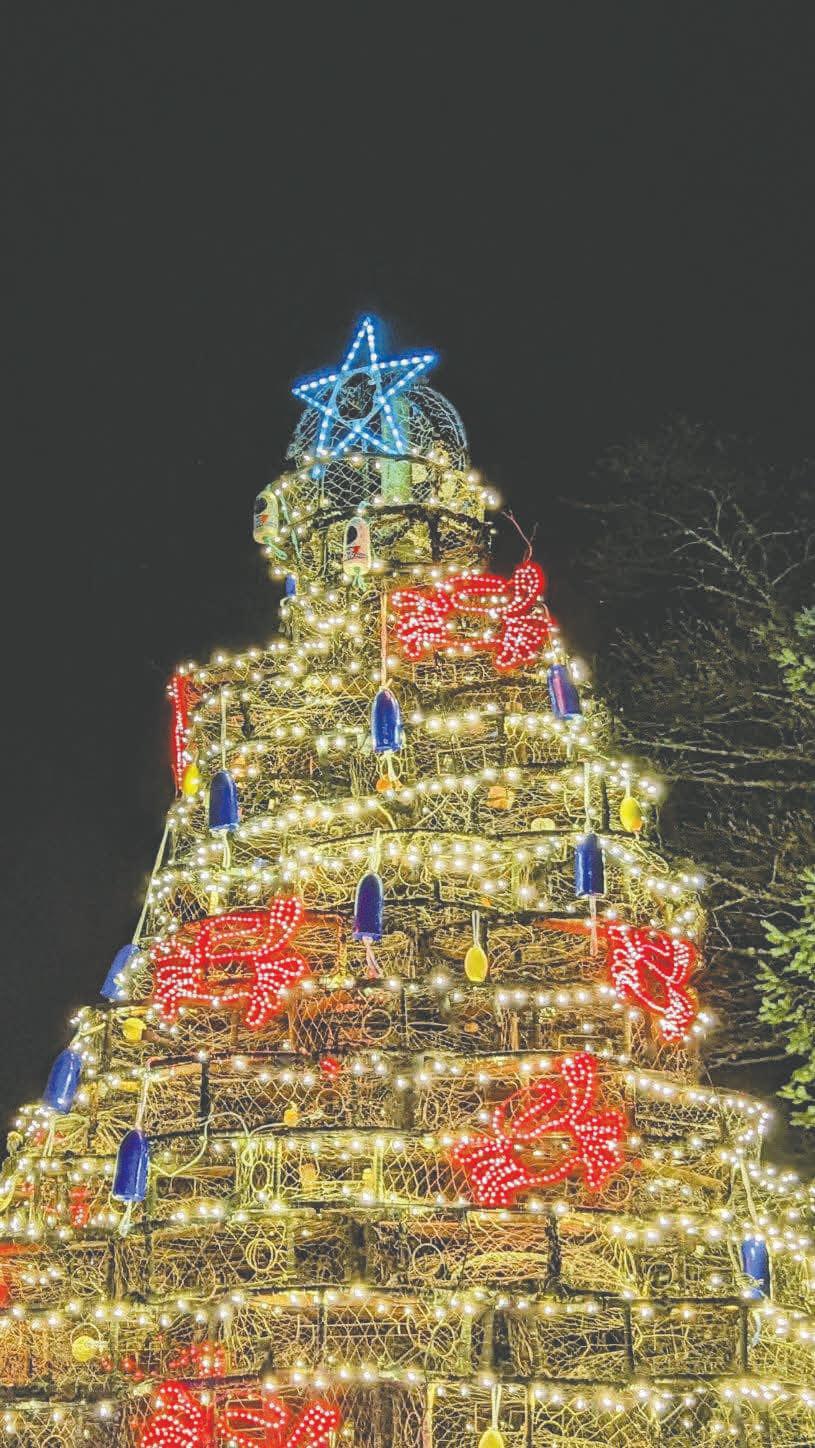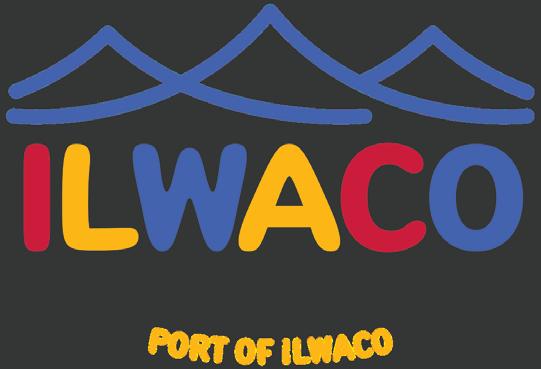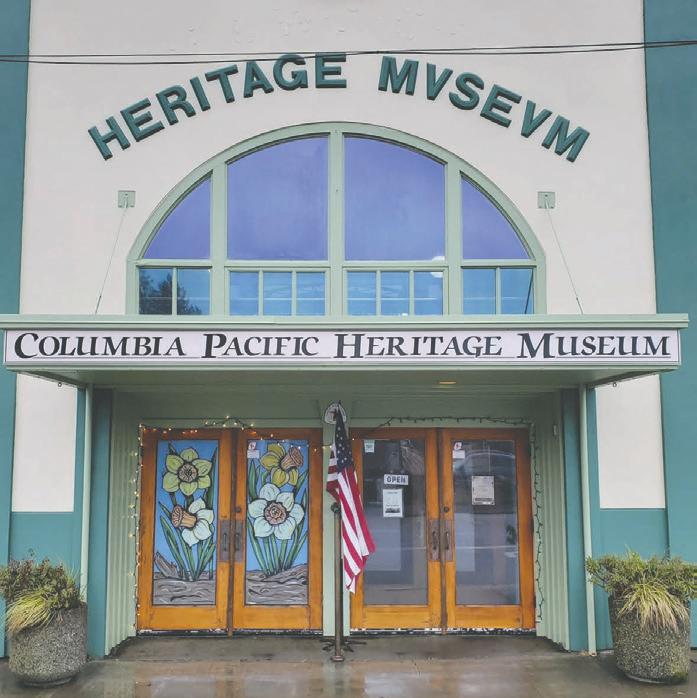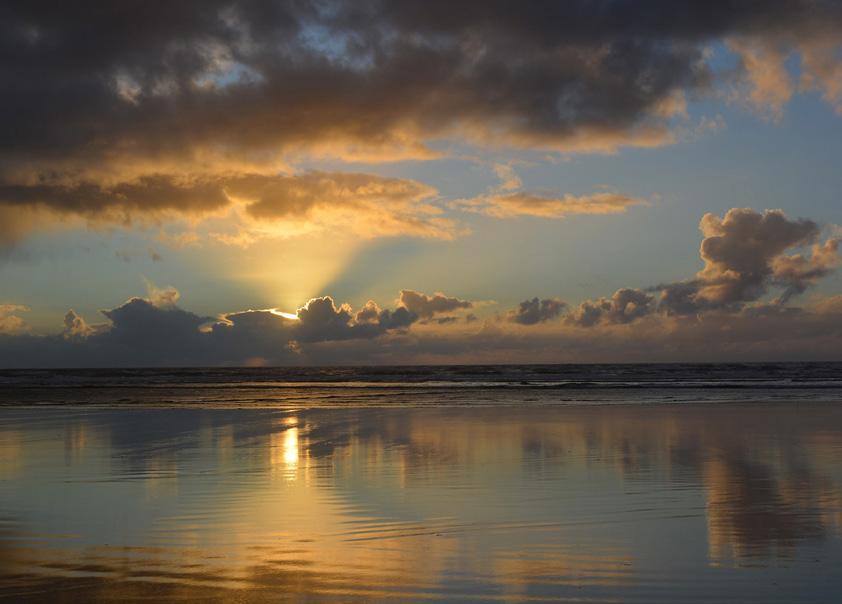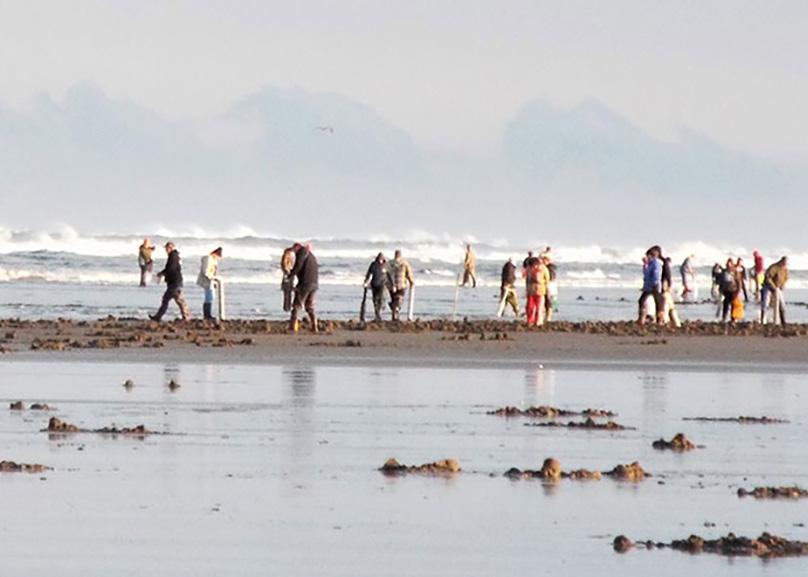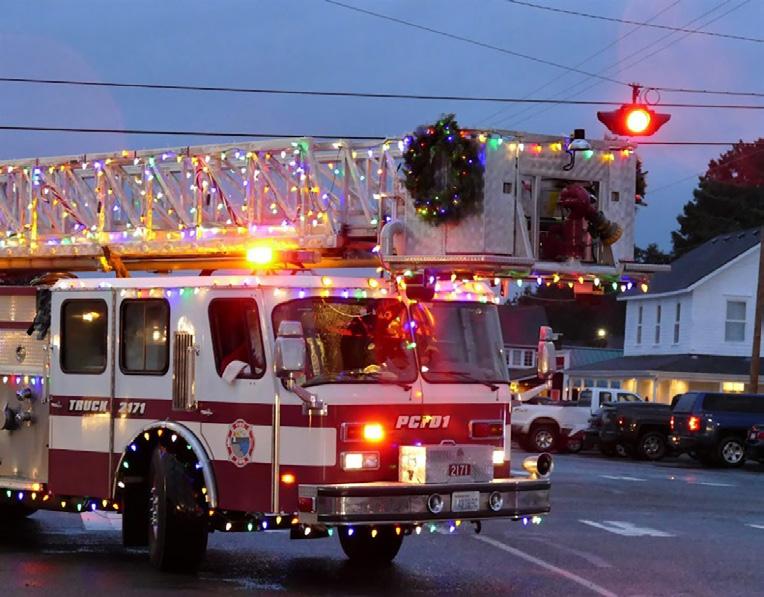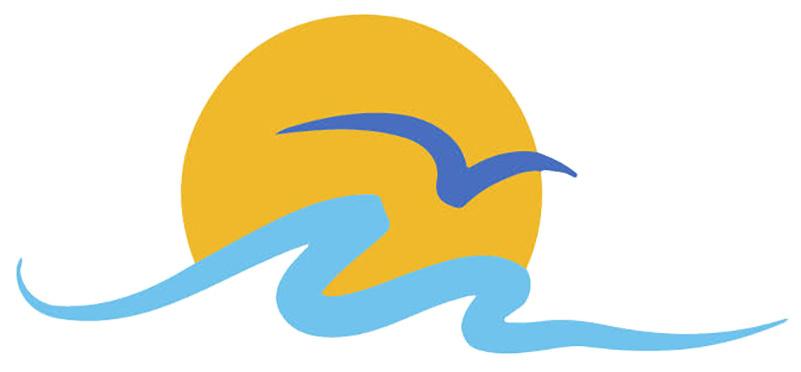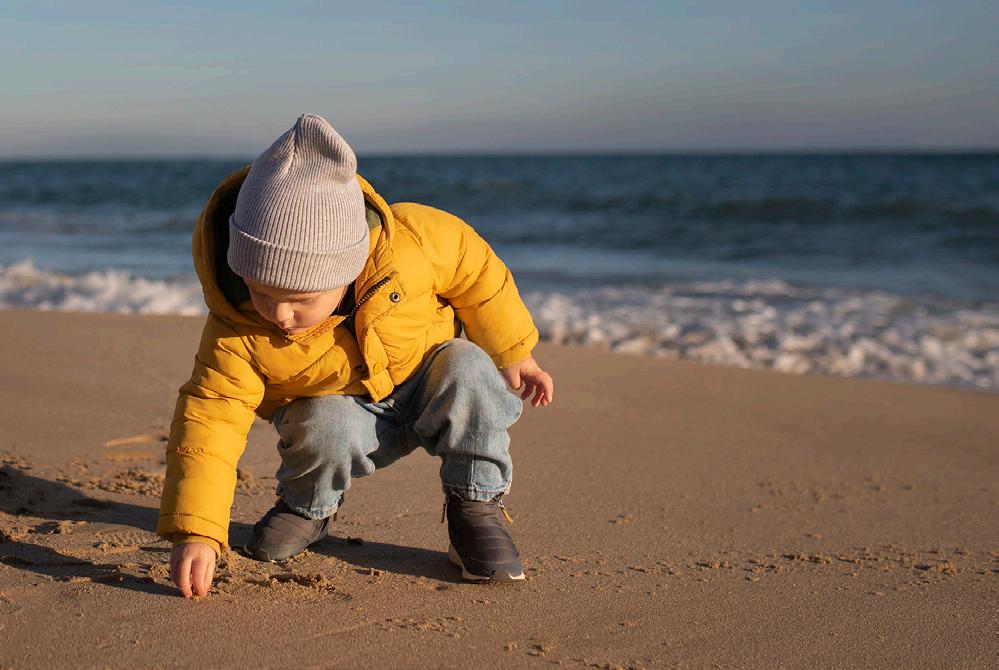

GROCERIES • HARDWARE • GENERAL MERCHANDISE
Contrary to what people say, we do not have everything. Contrary to what people say, we do not have everything.
Located at the light in the heart of Ocean Park


SEASONAL SEAFOODS
•
•
•
•
•
•
•







Contrary to what people say, we do not have everything. Contrary to what people say, we do not have everything.
Located at the light in the heart of Ocean Park


•
•
•
•
•
•
•




May – Sept.: Friday Columbia-Pacific Farmer’s Market in Long Beach
May – Sept.: Saturday Market at the Port of Ilwaco
May – Sept.: Chinook Sunday Market
May – Early Oct.: Astoria Sunday Market
May – Sept.: Ilwaco Art Walk (last Sundays)
June 8: Waikiki Beach Concert Series at Cape D: Lindsay Clark
June 8: Waikiki Beach Concert Series at Cape D: Chibia Ulinwa
June 21 – 22: Raymond Pride Festival
June 22: Peninsula Arts Association Art-A-Thon
June 23: Long Beach Peninsula Pride Festival
July 4: Ocean Park Old-Fashioned 4th of July Parade
July 4: Long Beach’s professional fireworks at dusk
July 4: Seaview Neighborhood Parade
July 5: Volunteer Beach Cleanup
July 6: Ilwaco 5k Firecracker Walk/Run
July 6: City of Ilwaco Fireworks Show at the port at dusk
July 6: Old Fashioned Tokeland 4th of July and Picnic
July 13: Waikiki Beach Concert Series at Cape D: Ezza Rose
July 13 – 14: Living History Encampment at Knappton Cove Heritage Center
July 13: Music in the Garden Tour
July 10 – 14: Sandsations in Long Beach
July 19 – 20: Bald Eagle Days in Cathlamet
July 20 – 21: Clamshell Railroad Days in Ilwaco
July 27: Waikiki Beach Concert Series: Duende Libre
July 27 – 28: 77th Annual Long Beach Rodeo
Aug. 3 – 4: Willapa Harbor Festival in Raymond
Aug. 10: Ilwaco Hook and Ladder Birthday Party
Aug. 10: Jazz & Oysters at Port of Peninsula in Nahcotta
Aug. 10 – 11: Tokeland Woodfest
Aug. 10: Waikiki Beach Concert Series: Olivia Awbrey
Aug. 15 – 17: Wahkiakum County Fair in Skamokawa
Aug. 19 – 25: Washington State International Kite Festival in Long Beach
Aug. 21 – 24: Pacific County Fair in Menlo
Aug. 24: Waikiki Beach Concert Series: Jenny Don’t and The Spurs
Aug. 16 – 17: Peninsula R&B Festival at Port of Peninsula in Nahcotta
Aug. 31-Sept. 2: Labor Day Weekend
Sept. 6: 21st Annual Ilwaco Slow Drag at the port
Sept. 6 – 8: 40th Annual Rod Run to the End of the World in Ocean Park
Sept. 13 – 15: 7th Annual Jeep Long Beach Event
Sept. 14 – 15: 42nd Northwest Garlic Festival
Sept. 17: Citizenship & Constitution Day at Knappton Cove Heritage Center
Sept. 20 – 22: Wings Over Willapa Festival
Sept.: Razor clam digging traditionally begins late this month
Oct. 5: 18th Annual Chinook Oktoberfest
Oct. 10–13: Peninsula Arts Association Fall Show
Oct. 13: Great Columbia River Crossing from Megler to Astoria
Oct. 12 – 13: Cranberry Harvest Weekend
Oct. 19: Water Music Festival
Oct. 26: Black Lake Witches Paddle
Oct. 31: Halloween events in Ilwaco and Ocean Park
Nov. 9 – 10: Columbia Pacific Fiber Festival
Nov. 10: “Horriable Day” at Knappton Cove Heritage Center
Nov. 24 – 26: Holidays at the Beach in Long Beach
Nov. 29 – Dec. 1: Peninsula Arts Association Fall Open Studio Tour
Dec. 1: Traditional start of Dungeness crab harvest
Dec. 6: Ocean Park Tree Lighting and Santa Arrival
Dec. 7: Crab Pot Christmas Tree Lighting at Port of Ilwaco
Dec. 8: Water Music Society Christmas Concert
Dec. 21: Ilwaco Sunset Christmas Parade
Jan. 1: Long Beach’s professional fireworks at dusk
acific County and the Long Beach Peninsula have been favorite Pacific Northwest vacation destinations for generations. They’ve become even more popular in recent years as families seek fun, affordable and safe breaks. We’re thrilled to welcome you. This is a user’s guide for those who have made the choice to visit this special corner of Washington.
We’re famous for beach fun, Pacific Northwest cuisine, Western history, fishing and clamming, bird and wildlife watching, gallery and antique shopping, hiking and bicycling, lighthouses, kayaking, kite flying and festivals, foraging and countless other outdoor adventures.
A University of Washington survey confirmed what we all know: It’s our clean and expansive ocean beach that draws hundreds of thousands of guests here, year after year.
If you’re introducing your children to the traditional fun of the seashore, Waikiki in Cape Disappointment State Park probably is the safest and most scenic of the ocean beaches. Bring picnic supplies and sunscreen from town. As always when near the ocean, know where your kids are at all times and keep them within easy reach. (tinyurl. com/CapeDfacts)
There are inviting alternatives to the ocean beaches, such as the small, sandy coves at Fort Columbia State Park on the Columbia River near Chinook. Other popular outdoor options include visiting the Willapa Bay shore, a place of expansive vistas and home to a large share of the American oyster industry.
This was the Lewis and Clark Expedition’s destination
in 1805, and you will literally walk in their paths. (www. nps.gov/lewi/index.htm) Discovery Trail from north Long Beach to Ilwaco pays tribute to their adventures here. Pause along the way to fly kites, dig clams and watch eagles. Detour a short way into Long Beach, Seaview and Ilwaco for every kind of delicious meal and shopping experience.
A short way north of Long Beach, the culturally rich and inviting top-end towns of Ocean Park, Nahcotta, Oysterville and Surfside must not be missed. (opwa.com) They combine warm hospitality with a profound sense of coastal tradition.
The Discovery Coast is famous for beach fun, Pacific Northwest cuisine, Western history and countless other outdoor activities & adventures.
It’s hard to imagine a set of picturesque coastal villages anywhere with more arts communities, nearly magically packed “general stores,” antique/junk shops, souvenirs and clothing. Everywhere in Pacific County, there are impressive museums and interpretive centers devoted to Columbia-Pacific history, kites, horse-drawn carriages, cranberries, oysters, lifesaving. Festivals devoted to everything from classic cars to small-town patriotism enliven all the year.
We’re delighted you’ve come to see us. Everyone here looks forward to being your host and showing you our own favorite things to do. Make yourself at home and start making amazing memories!
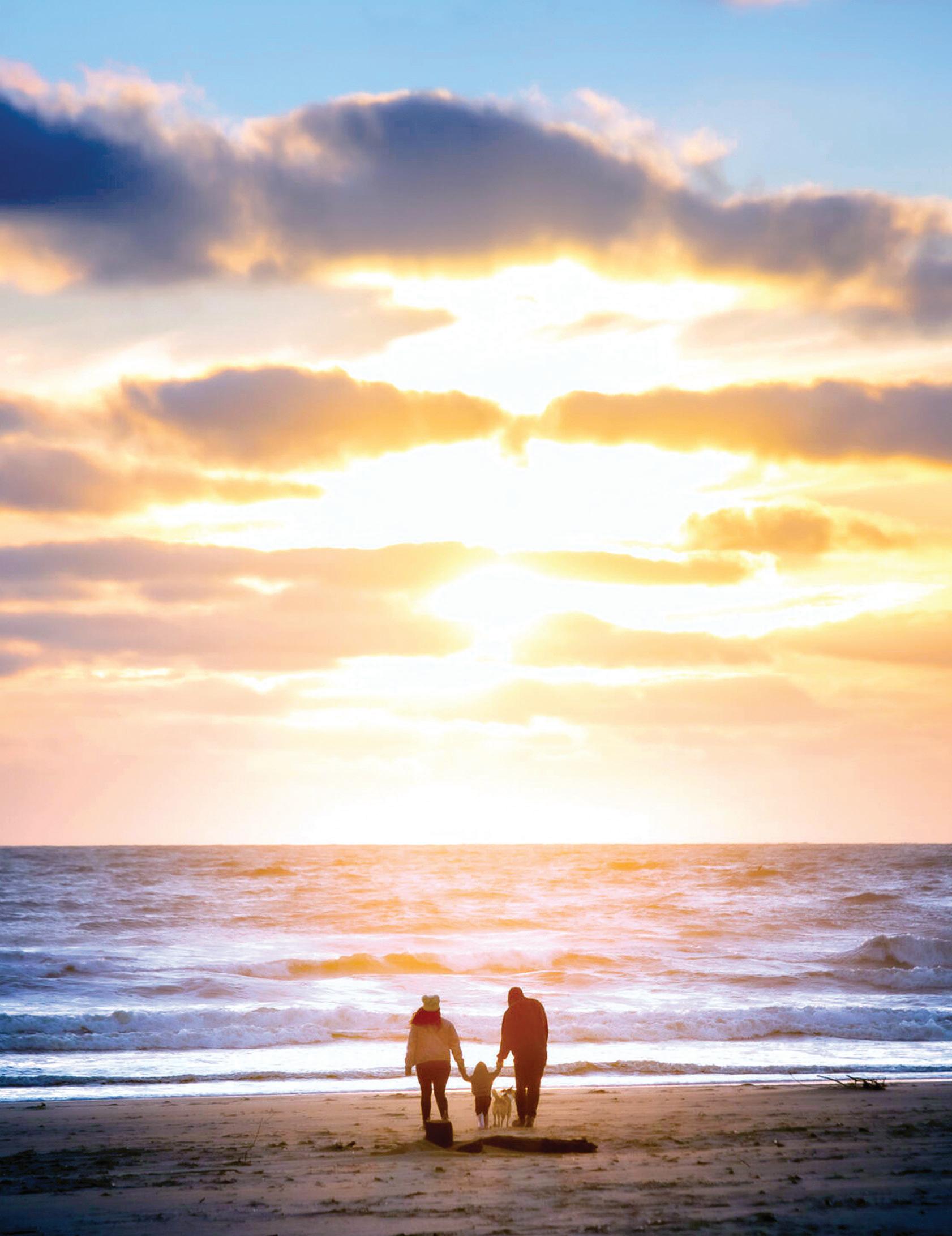
ON THE COVER: Digging for razor clams is a popular traditional activity, one of many reasons Pacific Northwest residents love coming to Pacific County. Our miles of beach — south and north of the entrance to Willapa — are famous for sunsets, nature watching and laid-back enjoyment. —
Ilwaco’s proud maritime tradition spans thousands of years, first in the cedar canoes of the Chinook Indian people, continuing on through the tall-ship era, up to the sailboats and fishing fleets of today.
Framed by one of the Northwest’s most scenic harbors, Ilwaco offers a firsthand experience of humanity’s long partnership with the Columbia River and the Pacific Ocean.
Summer and fall offer unparalleled opportunities to get out on the water, either in the pursuit of fish, or just to partake in the sights and sensations of one of the world’s mightiest rivers and neighboring ocean waters.
If fishing is your heart’s desire, public boat launches provide easy access to the water. No boat? No problem: there are charter offices to fulfill any angler’s request. North Jetty in Cape Disappointment State Park — part of Ilwaco — is an acclaimed place to cast a line or toss a recreational crab pot.
Wildlife and bird watching opportunities are remarkable. Seals, sea lions and whales all are spotted offshore. Humpbacks and orcas sometimes even make their way into the Columbia. White pelicans and bald eagles are among our rock-star avian species.
A full-service marina and boatyard and a waterfront promenade for strolling make Ilwaco Harbour Village a stop you don’t want to miss. Unique gift shops with that special something you can’t find anywhere else and art galleries for that one-of-a-kind treasure dot the waterfront.
May through September, the Port of Ilwaco hosts a Saturday Market that attracts vendors, craftspeople and musicians from around the region. Pick from the freshest produce, baked goods and plants. Wonderful crafts and handiwork abound with something new every weekend. It is open every Saturday, rain or shine, all summer long from 10 a.m. to 4 p.m.
Visit the award-winning Columbia Pacific Heritage Museum, 115 SE Lake St., to learn all about our amazing place, including the Ilwaco Railway & Navigation Co. Open Wednesday-Saturday 10 a.m.-4 p.m.
For more information go to: ColumbiaPacificHeritageMuseum.org

Framed by one of the Northwest’s most scenic harbors, Ilwaco offers an experience of humanity’s long partnership with the Columbia River and the Pacific Ocean.



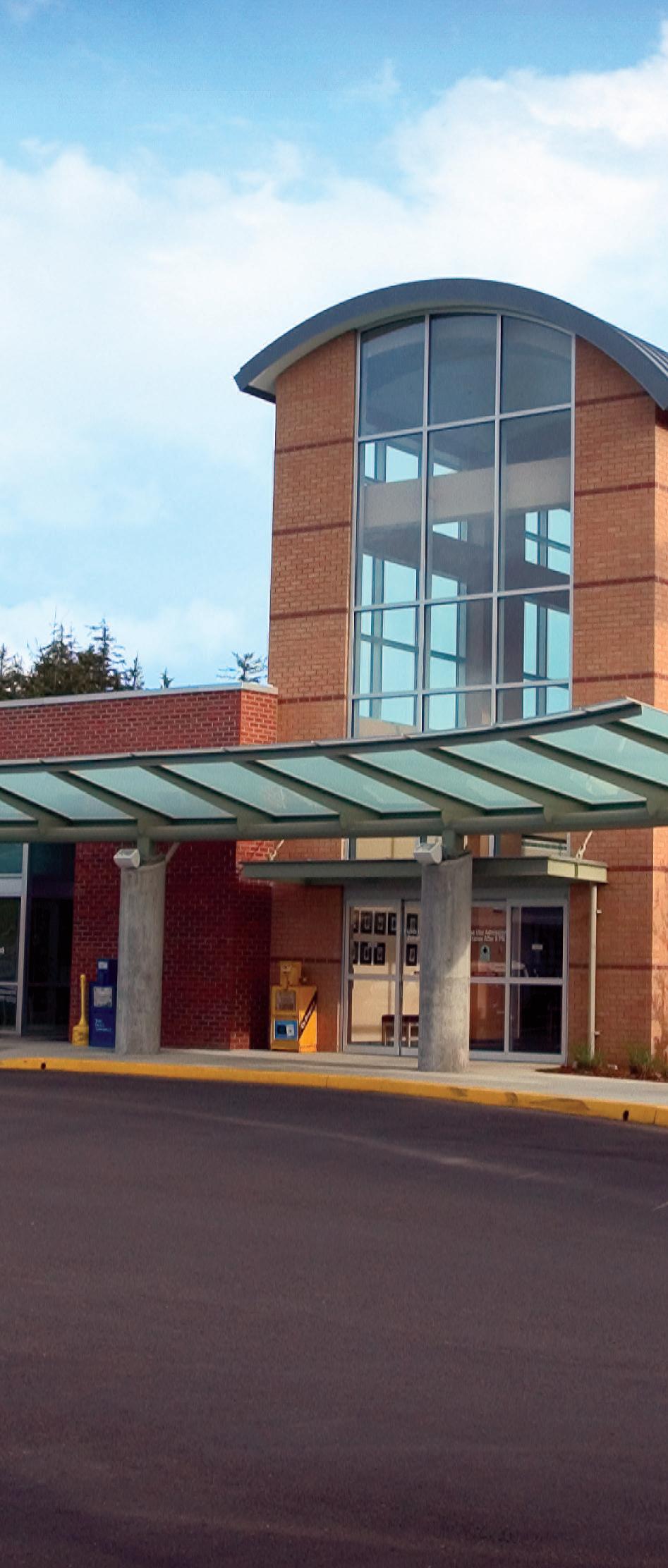


Locals think the name Cape Disappointment is an ironic joke, since Washington state’s farthest southwestern point is anything but disappointing.
Called Kais for thousands of years by our Chinook Indian neighbors, it is the site of one of Washington state’s most famous and popular parks. Its 2,000-plus acres include a premier campground, beautiful beaches, tide pools, public artworks, a boat launch, two lighthouses and a historical interpretive center, plus many miles of hiking trails.
If you want to camp overnight, book early, since the oceanside campsites are often fully booked weeks or months in advance. Cape Disappointment has 137 standard campsites, 50 full-hookup sites, 18 partial-hookup sites with water and electricity, five primitive hiker/biker campsites first-come firstserved, one dump station, eight restrooms (two ADA) and 14 showers (four ADA). Maximum site length is 45 feet (limited availability). Camping is available year round. To reserve a campsite, call 888-CAMPOUT or 888-226-7688.
There are three splendid beaches for beachcombing or just going for a stroll. Colorful painted crab-pot floats are a frequent find in midwinter.
• Waikiki Beach is located where the North Jetty meets the rocky cape. This is one of locals’ favorite spots for storm watching and photography because the waves crash on the cape here with the Cape Disappointment Lighthouse in the background.
• Benson Beach is the sandy stretch from the North Jetty to
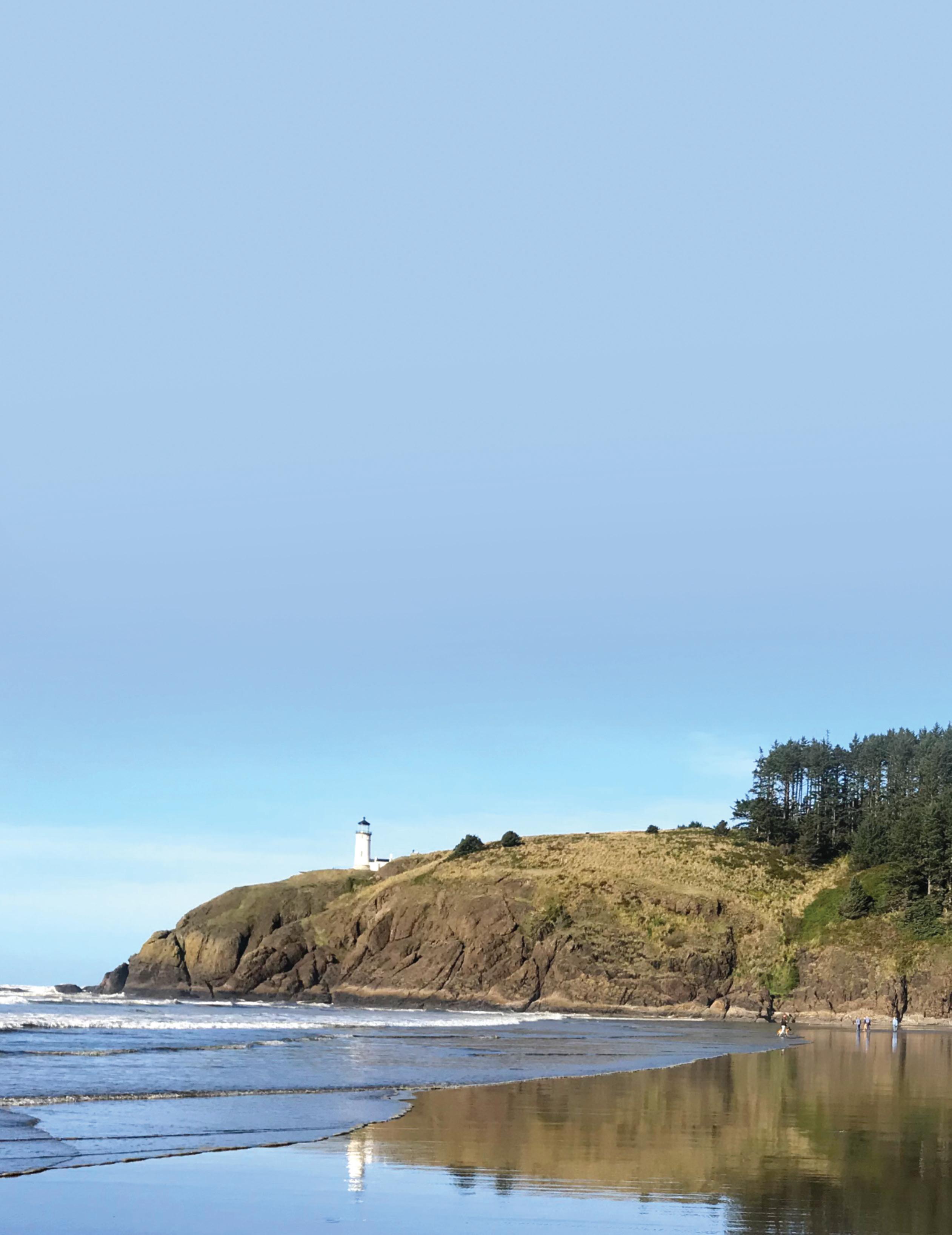
North Head. Hikers can enjoy the lack of vehicles, the huge driftwood trees and view of the North Head Lighthouse.
• Beards Hollow is on the southern stretch of the Peninsula’s main beach — north of North Head — offers visitors a chance to view tide pools at low tide near the historic “Fishing Rocks,” or take the Discovery Trail north to Long Beach or east to Ilwaco.
The Confluence Project site is one of seven locations on the Columbia River where internationally famed artist Maya Lin has created places to pause and reflect. Using the language of the Chinook people and members of the Lewis and Clark Expedition, the Confluence artworks put the explorers into perspective, encouraging the visitor to re-consider the cultural and natural layers of history found on the Lower Columbia. The Cape Disappointment installation includes a basalt fish-cleaning table, the Baker Bay viewing platform, several short trails and an amphitheater with a view of the ocean. Concerts are presented during the summer.
• Cape Disappointment Lighthouse was lit in 1856, making it the first in the Pacific Northwest. Although the lighthouse itself is not open to the public, the view from its grounds is astounding. It is reached by a trail starting at the Lewis and Clark Interpretive Center.
• North Head Lighthouse is second only in popularity to its beaches, the park’s North Head Lighthouse has recently been
fully and sensitively restored to its full 1898 splendor. Tours are available every 15 minutes from 11 a.m. to 3 p.m. daily through the end of September. Admission is $3 per adult. Children between 7 to 17 are admitted free in the company of an adult. Children under the age of 7 are too young to climb to the tower.
• Lewis and Clark Interpretive Center stands high on the cliffs of Cape Disappointment State Park, 200 feet above the pounding Pacific surf. A series of mural-sized timeline panels guide visitors through the westward journey of the Lewis and Clark Expedition using sketches, paintings, photographs, and the words of Corps members themselves. The center also features a short film presentation, a gift shop, and a glassedin observation deck with fabulous views of the river, headlands, and sea. Additional displays focus on local maritime and military history. It is open daily April 1-Oct. 31 and Wednesdays through Sundays Nov. 1-March 31, 10 a.m. to 5 p.m. Admission is $5 for ages 18 and older, $2.50 ages 7 to 17, ages 6 and younger are free.
• Hiking Trails on the cape stretch for more than eight miles. These lead hikers through multiple ecosystems, from coastal fog forest to the saltwater marsh to grasscovered dunes. The rustic trails cut through impressive huge old spruce and hemlock trees and often end up either at a lighthouse or at the abandoned military structures at Fort Canby. Hiking trail maps are available at the park office or interpretive center.
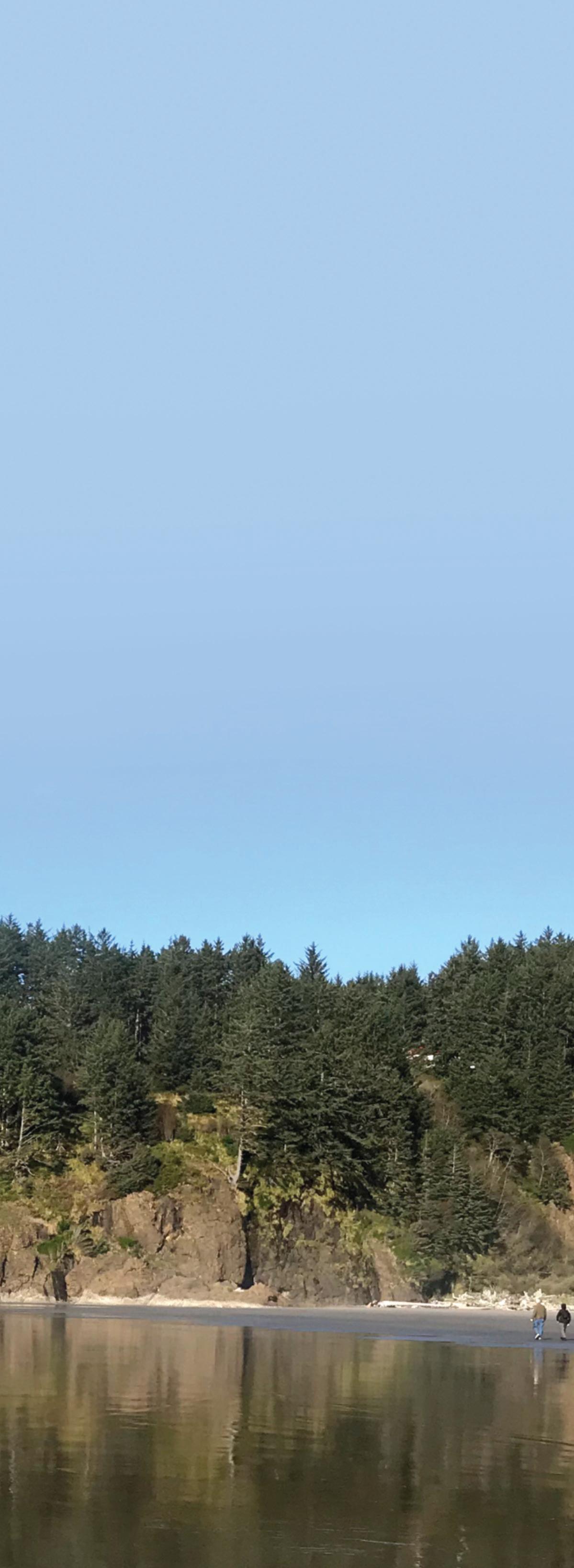

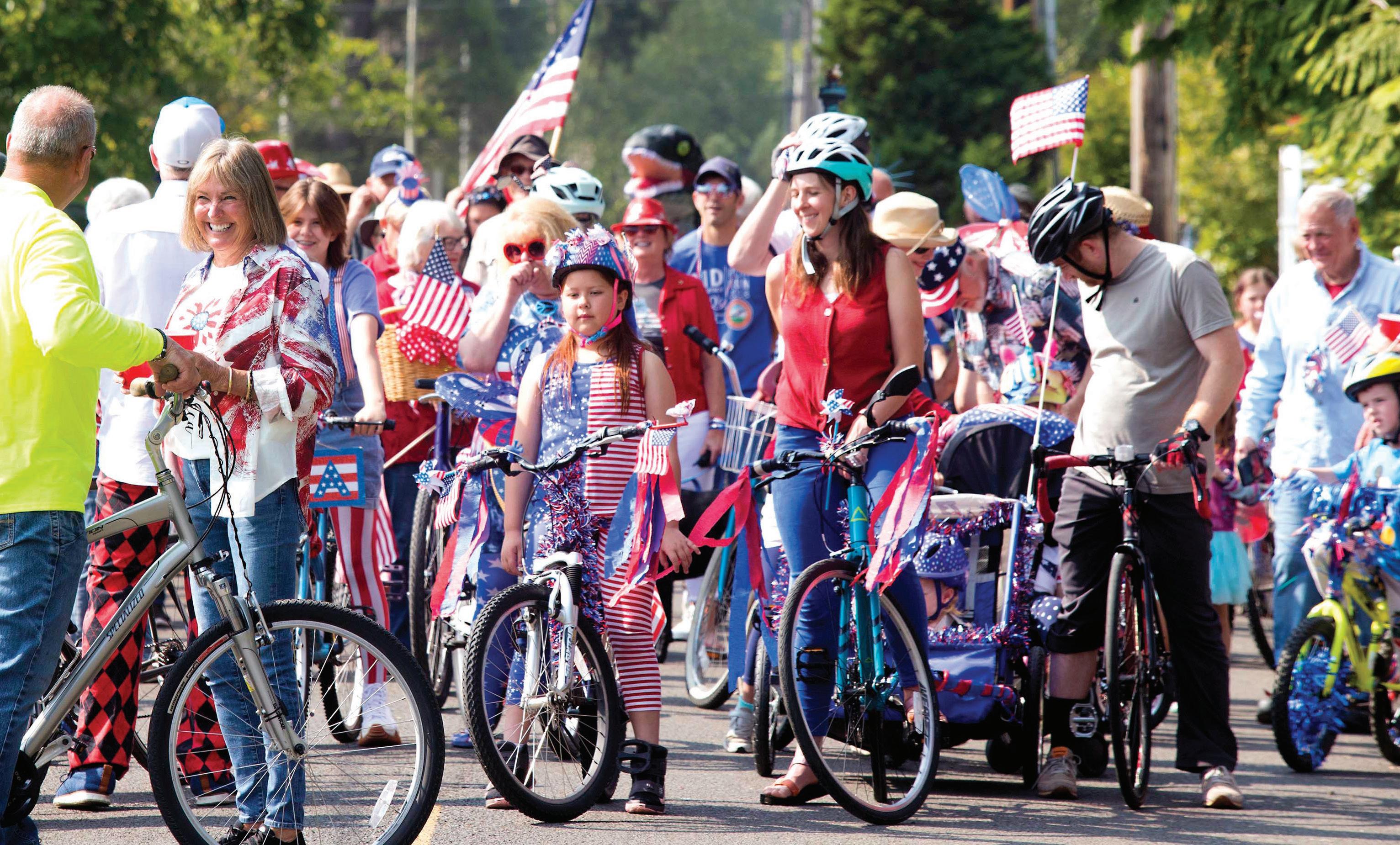
The Long Beach Peninsula’s southern portion contains a community with its own identity.
Seaview is located between Ilwaco and Long Beach, but has a character very distinct from its two neighbors. Its residents quite understandably consider it one of the Peninsula’s most “classy” villages.
It was founded in 1881 by Jonathon L. Stout and his wife, Anne Elizabeth Gearhart, daughter of Phillip Gearhart, for whom the town in northwest Oregon is named.
The two villages share parallel traditions of history and charm. They were developed during the very late 1800s, and the early days of the last century, when the wealthy Portland elite traveled to both by train in search of fun and cool summer breezes. Often, the women and children would stay all summer, with their working husbands leaving the metropolis to visit on the weekends.
Seaview is home to some wonderful B&Bs and restaurants, including the comfortable Shelburne Inn — a National Historical Landmark — and the fantastic Depot Restaurant. Also check out the eclectic Sou’wester Lodge & Cabins.
A walk through the narrow, leafy streets of Seaview will reveal plenty of historic homes, many marked with dates that stretch way back into history. Be aware, all are private property, so look but don’t trespass.
Seaview’s waterfront is a popular launching spot for walks south and north on the northwest’s longest beach.
Visitors may discover it is less busy in the summer than the Long Beach seashore access routes to the north — and thus more peaceful.
It is in Seaview where growth of the beach is most noticeable, with 2,000 feet or more of dunes now separating the village’s original shoreline from the ocean. Several shipwrecks lie under what is now dry land, including the Vandalia, which wrecked in 1853 with a loss of nine lives, and the Marie, which wrecked in 1852, also with a loss of nine.
Seaview’s waterfront is a popular launching spot for walks south and north on the northwest’s longest beach.
Miles of clean sand are home for many shorebirds, and there are pretty views of the distant cliffs and bobbing crab boats.
The Discovery Trail threads its way through the Seaview dunes, providing a walking/biking path all the way from northern Long Beach to Ilwaco.

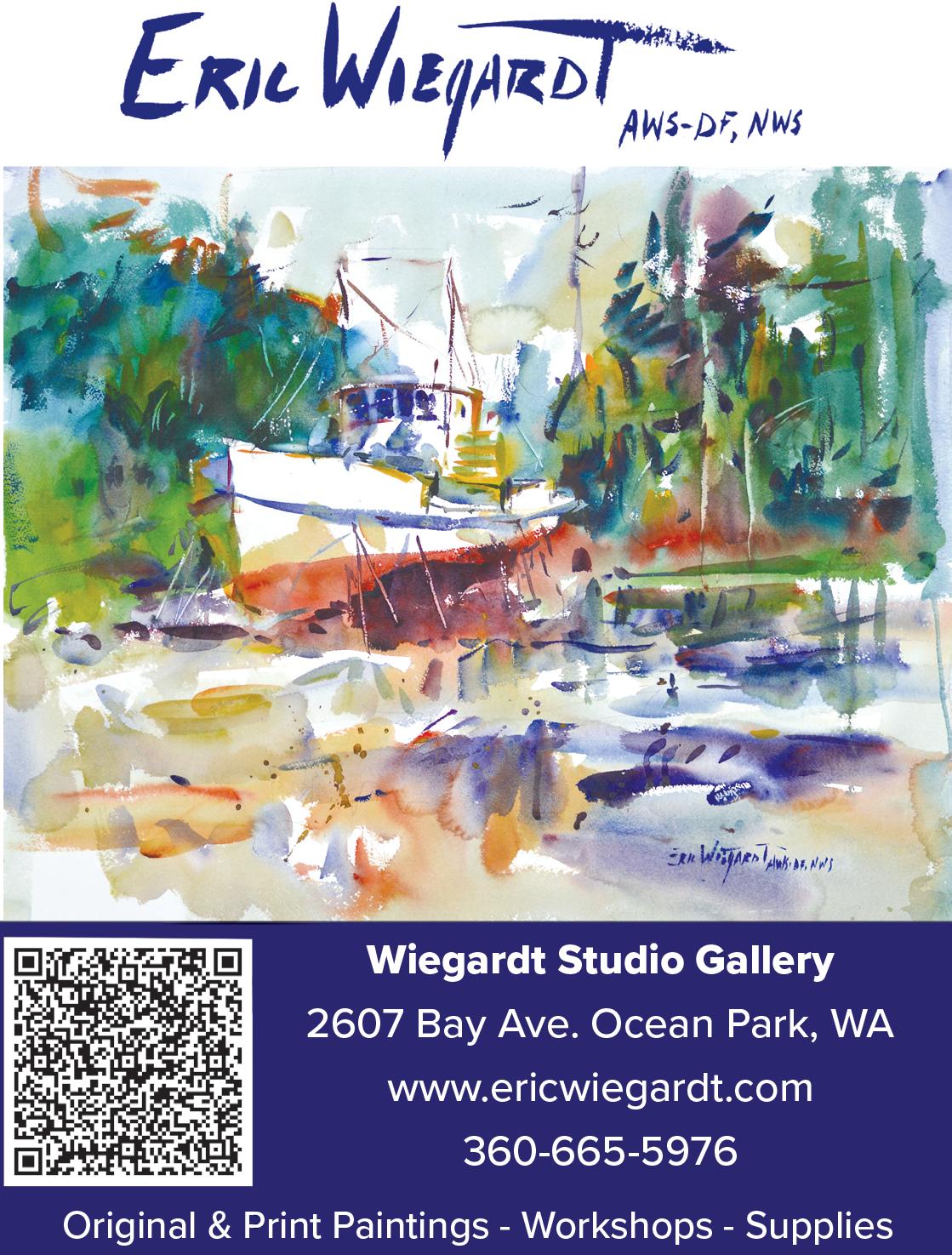

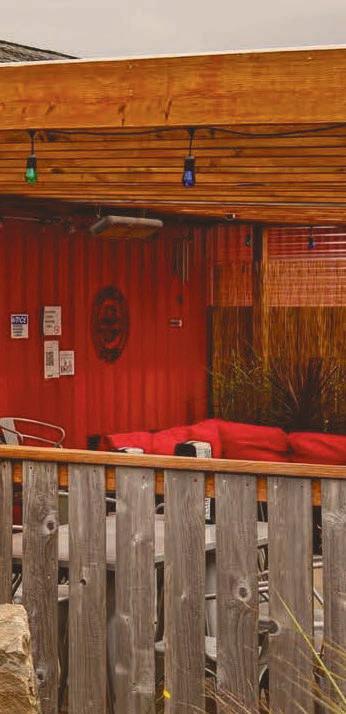



Long Beach is the only place on the planet with Jake the Alligatorman.
The star attraction at Marsh’s Free Museum downtown isn’t the only thing to see.
The community displays an eccentric charm, and has bustling summer sidewalks, many different festivals, and, of course, its soaring kites.
But don’t forget it is also is a place of incredible natural assets, with miles of beach, dunes and forests.
It is all about having fun with the family. Come see for yourself.
Founded in 1880 by Henry Harrison Tinker from Maine, Long Beach has always been a resort.
Peninsula visitors inevitably gravitate toward Long Beach’s shops and the many activities geared toward families, teens and children.
This is where you’ll find horse rentals, go-carts, video arcades, bumper cars and other traditional beach fare. It’s all safe fun, and the reasonable prices mean you can keep coming back for more.
Long Beach has much to appeal to mature visitors, such as its boardwalk, the excellent paved Discovery Trail along the crest of the dunes, and a variety of art galleries, gift stores and restaurants.
It boasts many motels, cosy bed-and-breakfast places and convenient RV parks, so finding a place to stay is rarely a problem.
But check the calendar before you try to book. On festival weekends, be sure to make your reservation way, way ahead of time, and then check in early on the day you arrive. Actually, that advice works all summer long.
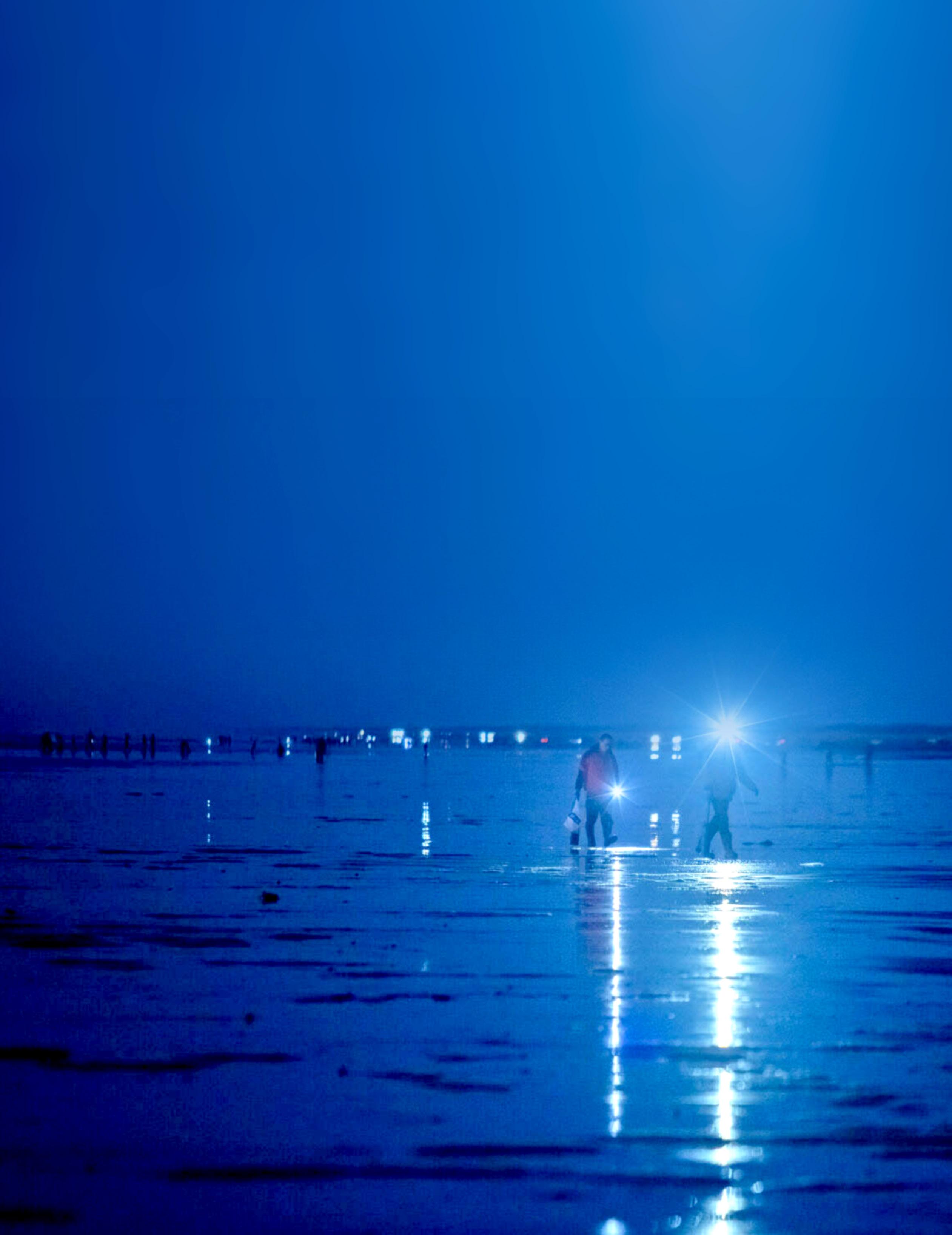
Long Beach is a place of incredible miles of beach, dunes and forest.
We think this place is a little piece of heaven. It is a locale with a solid core of reality — the people who make their homes here love it. It is, first and foremost, a community.
But it just happens to be located right next to the most spectacular sandy ocean beach. And, boy, is it long!
Long Beach displays an eccentric charm, and has bustling summer sidewalks, many different festivals, and, of course, its soaring kites.
The Long Beach Peninsula is the capital of clams
Peninsula people are passionate about razor clams. And with good reason, as this is the best place in the Pacific Northwest to stalk the delectable bivalves.
Good clamming is available along the entire Peninsula. However, the largest and most plentiful razor clams are typically found from around Surfside north to Leadbetter Point. As a general rule, clamming conditions are so good here that people drive for hundreds of miles to partake in this delicious family fun.
The Long Beach Razor Clam Festival in April shares the ins and outs of digging for razor clams while celebrating this foraging tradition. The festival originated in the 1940s, when a giant clam frying pan toured the region to promote the peninsula. Check out: LongBeachRazorClamFestival.com for festival updates.
For information about upcoming seasons and regulations or visit the WDFW online at http://wdfw. wa.gov/fishing/shellfish. Another good source of clam information is www.RazorClams.com, hosted by Jack’s Country Store.

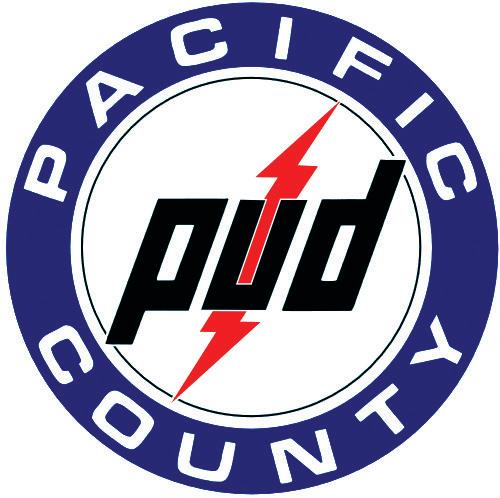


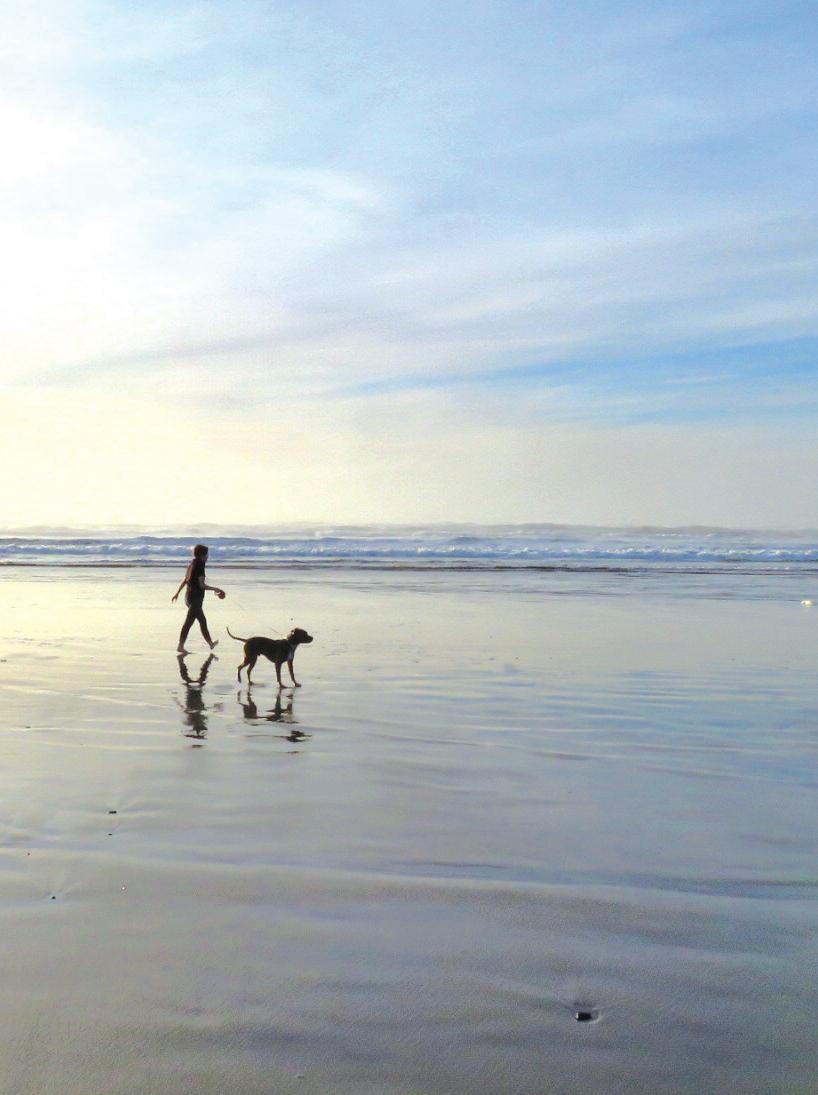




There is a certain feel to the north end of the Long Beach Peninsula. It is not bustling, but you can find most anything you need. It’s not jam-packed with shops side-by-side or people (unless a festival is going on). In fact, the Ocean Park Area Chamber describes the top end of the peninsula as “a step away from the crowds.” And that is fitting; that is exactly what it is.
Five villages share the north end: Oysterville, Surfside, Ocean Park, Klipsan Beach and Nahcotta. Oysterville served as the Pacific County seat from 1855 to 1893 until the “South Bend Raiders” came and took all county documents back home with them across the bay. Listed on the National Register of Historic Places, a quiet walk down the garden lined Territory Road offers beautifully restored homes to enjoy and a glance back at history. The Oysterville Church holds musical Vespers in the summer and the Oysterville Schoolhouse is a favorite gathering space for artisan festivals. Bayside, fresh seafood and beverages can be purchased to enjoy while relaxing on a deck overlooking Willapa Bay.
In contrast, the community of Surfside is more about the new. Just across the road from Oysterville and towards the ocean, Surfside has grown into a winding canal filled neighborhood of beachfront, flat land and ridges. In the summer and during holidays it is a commotion of fun, family and friends gathering. There is a beautiful golf course (with great dining), lodging with views to forever, a small essentials shop, an art
paper goods store and lots of deer.
Ocean Park arrived in 1883 as a Methodist Camp Meeting Association. Walking down the treed and winding Park Lane, just south of Bay Avenue, vintage homes and gardens are on view. Just north, on Park, is the century old Methodist Church, which is being lovingly renovated. Its bell tower is a landmark of the village.
The intersection of Bay and Vernon has the only stop light on the north end and it only blinks. The same intersection holds the stately Ocean Park Clock, a pharmacy and medical center, two favorite watering holes and an iconic general store that still uses sliding ladders to access stock. PCFD#1 (known by locals as the Ocean Park Fire Department) and the well loved Ocean Park Elementary School are further anchors in this most town-like of villages on the north end.
Artist galleries and studios, antiques and collectibles, a yarn shop and coffee house, eateries, floral, services going from automobile repair to banks and accounting and the helpful chamber office are situated here as well. Campgrounds and picturesque lodgings are sprinkled throughout. A beach to bay trail runs east to west along Bay Avenue and in the early spring, the eastern end of this path is a riot of color as thousands of hand-planted daffodils emerge. This planting by a community group caught on…all around the north end thousands more daffodils have been planted by locals, businesses and school children.
The Ocean Park Area Chamber describes the top end of the peninsula as “a step away from the crowds.
South of Ocean Park stands Klipsan Beach. In 1891 it became a U.S. Life Saving Service Station, a necessary thing for a piece of coastline named the Graveyard of the Pacific. Although the station was closed in 1947, several of the painted (white, red and green) US Coast Guard buildings are still there, under private ownership. The Klipsan Beach approach is a popular route to start the drive north along the sand to either the Ocean Park or Oysterville beach approaches. Tide tables are a must for this type of activity.
In early days, Nahcotta was the end of the line for the Ilwaco Railway and Navigation Company. For over 40 years, this line ran a railroad service from Ilwaco up the coast to Nahcotta, making stops along the way to load and unload cargo, passengers, Life Saving Service crews and equipment and the economically important oysters and shellfish from Willapa Bay.
Home, in the past and present, to several canneries, shellfish industries along with crabbing and salmon fisheries, Nahcotta is also home to the Port of Peninsula. The port is a mainstay of support and resources to those operating businesses on the pristine Willapa Bay. Always adding and improving facilities, the creation of May West Pavilion Park has given the community a favored place for festivals and gatherings. Morning sunrise, seen from the parking spot at the north end of the port can be amazing. Not only brilliant colors and cloud formations, but sightings of Great Blue Herons as they meet the day and if you are especially lucky, the age old vision of oystermen walking the flats to begin a day of work.
Sunsets to cry for, clamming with the wind and rain in your eyes, wildlife everywhere and birds waking you with their birdsong — this is what makes the north end different. You are invited to come and experience the wonder for yourself.

Nahcotta is an excellent place to experience the traditions of Willapa Bay.
It is all about fish, oysters and clams.
A stroll around looking at the boats and oyster processing equipment is a great appetizer before sampling fresh local seafood.
The tiny village is rich in tradition and history with little remaining evidence of a commercial rivalry that nearly tore the community in half more than a century ago.
If the birth of Nahcotta came about with its platting and the struggle surrounding it in 1889, its conception may have taken place decades before when bands of Chinook Indians — among them Chief Nahcati, for whom the village was named — lived along the western shore of what was then Shoalwater Bay.
Nahcati’s camp was said to have been nestled near Paul’s Slough just south of the present Nahcotta mooring basin.
Here the Native Americans found an abundance of fresh water, dry land, ample clams, oysters and salmon from the Shoalwater, and wild game in the forests. The settlements were well out of reach of the cold winter winds off the Pacific and far from the noise of pounding surf.
Heading for home in Nahcotta with a full load of oysters. —
BONNIE LOU COZBY PHOTOOysterville could be the only place in the United States that has always had human occupants.
The Chinook Peoples came to the area that is Oysterville at seasonal intervals for untold centuries to harvest its bountiful oyster beds.
Its history is rich in detail. Sure, times have changed, but if there is one place that resembles that fictional Shangri-La — an idyllic community where life is frozen in time — this is it.
Native Americans have always lived here. Oysterville itself was first settled in 1841 by John Douglas, who married a local Chinook woman.
The California Gold Rush of 1849 drew significant numbers of settlers of European descent to Oysterville. Gold miners spent their earning on Willapa Bay oysters. Settlers and the Chinook Peoples gladly filled schooners with oysters to be shipped to San Francisco.
By 1854, a community of several hundred, then called Oyster Beach, existed. On April 12, 1854, I.A. Clark filed a 161-acre land claim that encompassed all of what is now the Oysterville National Historic District.
On Aug. 5, 1854, community leaders decided that Oysterville was a better name than Oyster Beach or Shell Beach to represent their town. It grew to a population of about 800.
However, like all extraction businesses, the native oyster business inevitably came to an end. Hotels, saloons and a college

all disappeared as people sought greener pastures. Eventually, even the county seat was removed to South Bend, on the east side of the bay.
But all is well. History has been saved, and it can be truthfully described as “living history.”
With Willapa Bay as its backdrop, the 80-acre Oysterville National Historic District and the areas immediately adjacent to it, feels like a movie back lot version of a 19th-century coastal community.
Eight houses, a church, the Oysterville cannery and a oneroom schoolhouse are on the National Register of Historic Places. And some structures date back to the 19th century.
Oysterville is a “ghost town” only in the sense that it exudes a deep sense of the past. Its homes have been lovingly restored in ways that would make their original owners proud — walking around to look at them and the bay is the main activity. Although you won’t find a lot to buy in the village, there are some options, including at Oysterville Sea Farms and the Oysterville Artisan Faire at the schoolhouse in July.
Oysterville Church is open every day. It is a remarkable wedding venue and hosts a popular series of nondenominational services and musical performances on summer Sunday afternoons. It is maintained by the nonprofit Oysterville Restoration Foundation.

Willapa Bay is a delight.
Eelgrass beds, quiet inlets and diverse shorelines await boaters. There is an abundance of wildlife watching. Look for critters like raptors, elk, raccoons, great blue herons, flocks of waterfowl and shorebirds and even bear.
One landmark at its heart is Long Island.
The 4,700-acre nature wonderland is home to an abundance of birds and animals. It contains one of the last remaining reproducing climax forests, a unique, 274-acre stand of cedars that first sprouted during dramatic West Coast climate change some 4,000 years ago.
The cedars average five to seven feet in diameter, although some are 11 feet wide. They average 150 to 160 feet in height. In 2005, a trail to the grove was dedicated to former Washington Congressman Don Bonker, who led efforts to preserve the cedar grove and Long Island.
The grove is just one small part of the island, which is managed by the U.S. Fish and Wildlife Service.
Visitors must provide their own boat to traverse an approximate 100-yard channel from the boat launch at the Willapa National Wildlife Refuge headquarters on U.S. Highway 101. If they launch from the Nahcotta Boat Basin, the crossing is approximately one mile.
Refuge staff warn all boaters to use caution because tides and weather heavily influence the shallow bay. Their web site at www.fws.gov/refuge/willapa/visit-us offers some advice worth sharing to anyone using a water craft to go to Long Island or around the bay.
High winds can cause dangerous water conditions. Low tides can leave boaters stranded on soft mud. They recommend boaters carry up-to-date tide charts, technology to access current weather reports, emergency equipment, spare batteries, and a way to communicate, like a satellite phone or a 2-way radio.
Refuge managers also note that people should be sure to haul up boats above high tide marks and secure them if leaving them on shore. And to respect private lands and tidelands.

Leadbetter Point State Park is an amazing place. But when you visit, wear sensible walking shoes!
Adjacent to the Willapa National Wildlife Refuge, this park features several hiking trails that lead to the Pacific Ocean or along Willapa Bay.
The northern tip of the peninsula is an excellent birding location. Many shorebirds rest and eat here.
The forest is pristine, though quite new in geologic terms. Wander through the forest carpeted by kinnikinnick and coastal strawberry plants. Stop and admire the diversity of mushroom species found here in the fall.
Bring boots or waders, especially in the winter, because trails frequently flood. Stroll the bay-side trails for a respite from the ocean’s winds or away from the summer’s mosquitoes.
Phone the Willapa National Wildlife Refuge headquarters at 360-484-3482. Also check out the Friends of Willapa National Wildlife Refuge at friendsofwillaparefuge.org or write to the Friends at P.O. Box 1130, Ocean Park, WA 98640.


157 Howerton Ave (Port of Ilwaco) 360-642-7667 • tebooks@willapabay.org Mon - Sat 10 am - 5 pm • Sundays 11 am - 4 pm
Andi Day, executive director of the Long Beach Peninsula Visitors Bureau. is convinced.
“It’s the nicest trail on the West Coast, if not the United States,” she says.
Who can argue?
The Discovery Trail links Long Beach, Seaview and Ilwaco.
It is great for walkers of all ages to enjoy healthy outdoor exercise while savoring some unbeatable scenery — and it’s fun knowing that you are treading in the footsteps of history. The trail follows the general path taken by Capt. William Clark and his men during their initial 1805 visit to the beach.
It was created after the 2005 Lewis and Clark Bicentennial by Visitors Bureau leaders, Pacific County, the cities of Long Beach and Ilwaco, Washington State Parks and the U.S. National Park Service.
The trail connects the northern city limits of Long Beach to Beards Hollow in Cape Disappointment State Park and allows walkers to enjoy the dunes, Sitka spruce and a conifer forest. Storyboards describe black-tailed deer and shorebirds you might encounter on the way, as well as details of tides and beach erosion.
From Beards Hollow, a short unpaved portion goes uphill to a spectacular ocean overlook. Again paved, it winds its way through the forest to Ilwaco.
A stroll on the original segment of trail directly west of downtown Long Beach may take only half an hour. Longer expeditions along its full eight miles can encompass up to several hours with stops along the way to admire the many sights.
A sculpture of a whale skeleton similar to the one Lewis and Clark found more than 200 years ago, a monolith with an explorer standing nearby, add interest. A small wooden bridge, plus numerous twists and turns amid the rolling dunes, make for an interesting trip.
If eight miles walking or riding your bike for over an hour seems too much, why not begin at either the Seaview or Long Beach approaches? That can cut your ride in half.
The unpaved portion, from Beards Hollow to Ilwaco, includes some steep hills, but is otherwise fine for fit walkers or mountain bikers. A wooden causeway leads over a pristine marsh just as the trail leaves the hollow.
Motor vehicles are not allowed on the Discovery Trail. There is free access to the northern part parallel to the ocean. The southern portion of the trail going through Cape Disappointment State Park requires a Discover Pass (One day, $11.50; one year, $35).
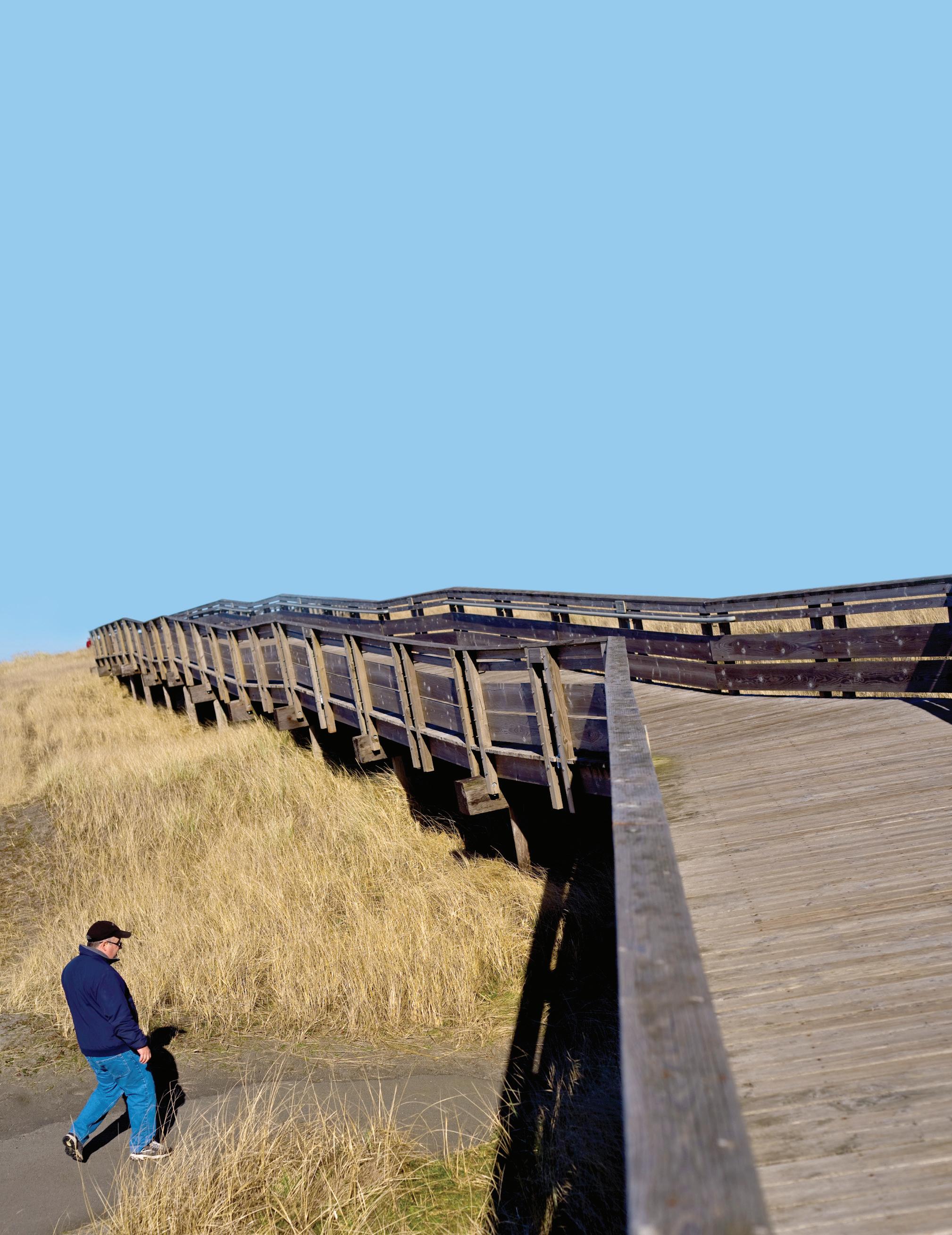
The Long Beach Boardwalk forms a key link in Discovery Trail, which spans the coastal dunes and forests between north Long Beach and the Port of Ilwaco.
DAMIAN MULINIX PHOTOflying on the Peninsula Long or short, the trip is beautiful and worth it
When folks look at jewels in the Long Beach Peninsula’s crown, the World Kite Museum is a contender for the most sparkling.
The museum is a remarkable showcase of the history of the kite in recreation, in warfare, rescues and communication. It also celebrates cultures from around the world.
The museum and shop on the beach end of Sid Snyder Drive in Long Beach is also the headquarters for the Washington State International Kite Festival Aug. 19-25. It is the most colorful event of the season.
Supporters and volunteers continually work to make this museum a living and high-flying celebration of kiting fun.
A room adjacent to the main display area is dedicated to showcasing kites with military, communications and rescue uses. Some were designed in Afghanistan and countries in the Middle East. Others saw service by Allied and other units in the two World Wars. A box kite carried a transmitter to assist in rescues, one collected barometric data, another was used for Arctic mail delivery.
Check out the horse kite, too. It took four volunteers to get that one into place, hanging from the ceiling in cavaletti style — an Italian word for small horse jumps used in dressage training.
Another key display highlights bird kites from around the world, many from Asia. Some fantasy kites have the bodies of other critters, including a lizard, frog and even a tiger.
The Kite Festival draws people from around the world, so if you plan to attend book your hotel early.
Starting on Monday and ending on Sunday, this Long Beach showcase event boasts skies ablaze with color, high-flying action and choreographed movement. Washington’s kite festival draws internationally famous kite fliers and tens of thousands awed spectators, many of whom participate with their own kite-flying adventures.

World Kite Museum and Hall of Fame
303 Sid Snyder Drive, Long Beach
To volunteer, contact info@worldkitemuseum.com
To learn more about the museum, call 360-642-4020 or go to: KiteFestival.com

Thousands of classic car aficionados converge on the Long Beach Peninsula for the annual Rod Run to the End of the World the weekend after Labor Day.
Festivities kick off Friday with the Slow Drag competition at the Port of Ilwaco.
The main event at Wilson Field on Sandridge just east of Ocean Park is a pilgrimage for car enthusiasts across the Pacific Northwest. Often considered the grand finale of Pacific County’s primary visitor season, the weekend attracts a funloving crowd who show off their vehicles on area streets and highways.
“I look forward to this event every year,” said a Kelso resident, who purchased property in Ocean Park, largely to have a space to stay in this camper when the car show comes.
For many, Rod Run is a family tradition.
“He’s been here every year of his life, since he was a little baby in a stroller,” a father said of his now-grownup son. They’ve worked together to restore a 1955 Ford. “It’s an annual thing and a nice getaway to come down here.”
With the nation returning to something more like normal, the host Beach Barons Car Club is accepting registrations for the 40th Rod Run on Sept. 7 and 8, 2024.
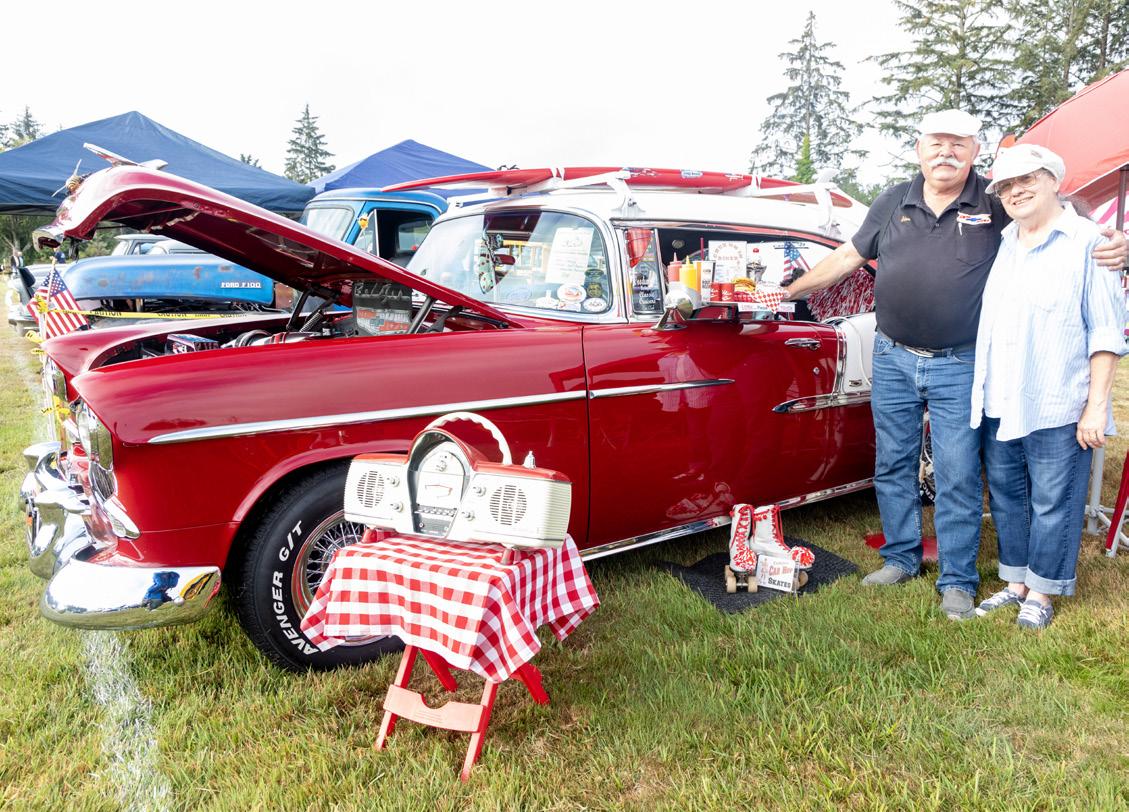
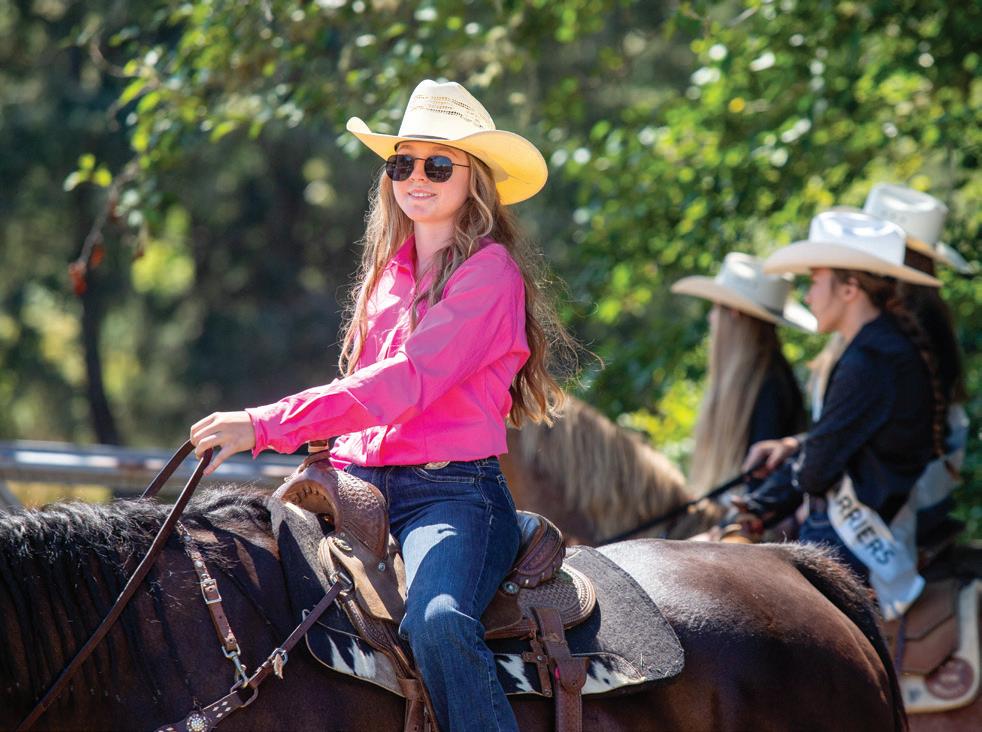
Come early and enjoy the day.
That is the call from leaders at the Peninsula Saddle Club, who will host the 77th annual Long Beach Rodeo.
This year’s arena action starts at 1 p.m. July 27 and 28, but organizers are keen to make sure people come for breakfast and are in place early for the start of each day’s events.
Events take place at 6407 Sandridge Road on the Long Beach Peninsula (1 1/4 mile north of the Highway 101 junction on Sandridge Road).
This Northwest Professional Rodeo Association rodeo is one of the longest running rodeos on the Northwest coast, and draws traveling professionals from around North America. Wallin said it is considered the longest-running continuous event on the Peninsula.
It all began years ago with horse races on the beach 76 years ago. The Peninsula Saddle Club hosted its first rodeo in 1951. At that time, the rodeo was held just north of downtown Long Beach (where the fire hall is located). The club moved to its present location in 1957.
The rodeo gets started with a mounted parade through downtown Long Beach 6:30 p.m. Friday, July 26. The parade runs from the Dennis Co. to Sid Snyder Drive.
Rodeo admission is: Adults $20, seniors $15, children 6-12 $10 and children 5 and under are free. Advance tickets can be obtained at the Peninsula Pharmacy.
For more information about the Long Beach Rodeo go to: www.PeninsulaSaddleClub.com
Annually people pour down to the seashore burbling with a sort of primeval wonder. The presence of orcas, sea lions, great white sharks, blue whales and other superstars of the animal kingdom is a large part of our fascination with the state’s coast.
Throughout winter and spring, Pacific County residents and visitors keep close track of amazing months-long hunts by the L pod of Southern Resident Killer Whales, sometimes joined by members of the J and K pods. All have been celebrities around Puget Sound and the San Juan Islands for decades, and serious concerns about their survival have prompted renewed collaborative efforts to enhance salmon habitat and hatchery production to provide human aid to these wondrous critters.
Tagging by the National Oceanic and Atmospheric Administration allows us to systematically keep up with their adventures in the open ocean, sometimes swimming within sight of the Long Beach Peninsula and Cape Disappointment.
We can peek through and catch the slimmest glimpse of a swirling, mysterious maelstrom in which warriors undertake epic journeys. Maybe they quest after adventures as much as they pursue fish? We know they love Chinook salmon as much as we do — perhaps more.
As it is, keep your eyes open when on the beach or especially when out on a charter fishing trip for orcas, humpbacks and other denizens of the deep.
If you catch a glimpse of one, that memory will surely last a lifetime.
Gray whale sightings are routine in during spring and fall migrations. The Lewis and Clark Interpretive Center in Cape Disappointment State Park is a nice place to look for whale spouts. For more info, visit www.WhaleSpoken.org

This humpback whale breached from the ocean off Bay Avenue in Ocean Park. Large numbers of humpbacks, which eat small fish, typically visit Pacific County waters each summer. — TRACEY CURRY PHOTO


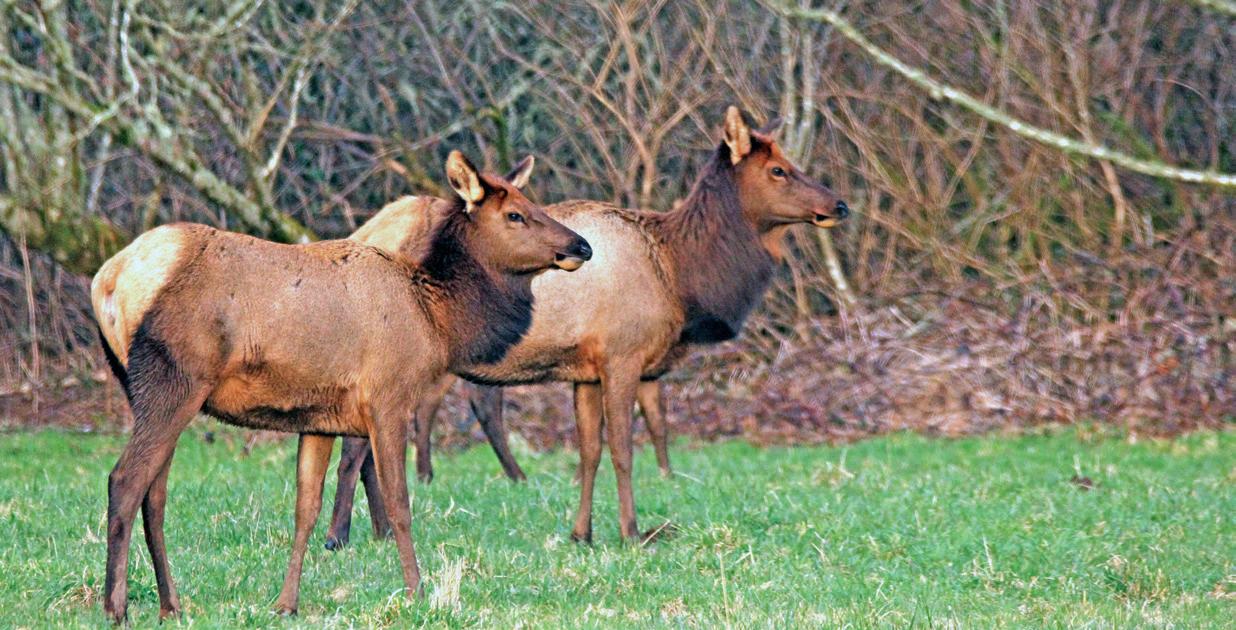

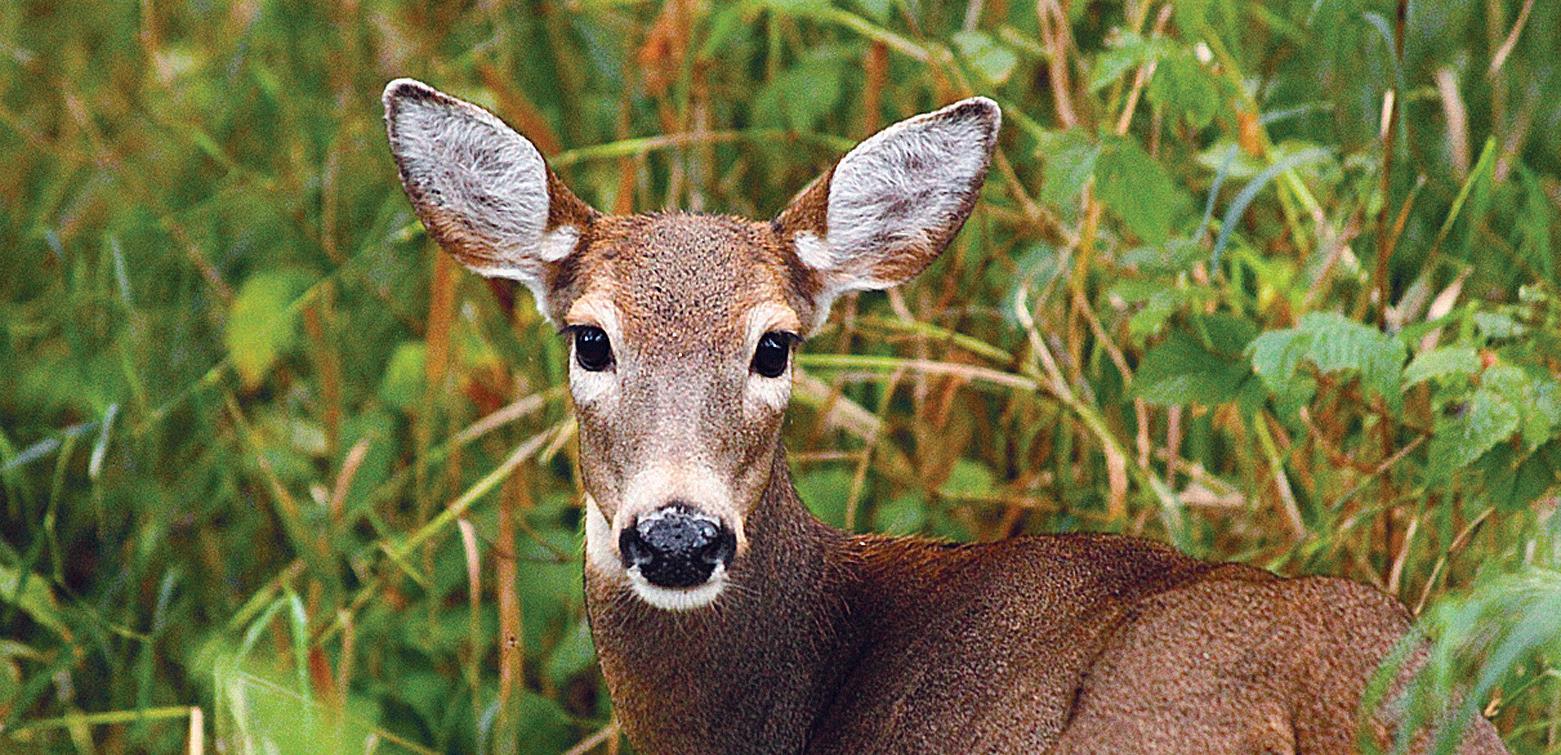
If there is one word to describe wildlife on the Discovery Coast it is abundance.
There are more bald eagles than anywhere south of Alaska, and more pelagic and coastal seabirds than anywhere on the West Coast.
Seals and otters, herds of deer and elk, migrating and resident songbirds and waterfowl can be observed in large numbers.
Here is a roundup.
Peregrine falcons are frequently observed swooping down from tree top perches as they intercept prey in Leadbetter Point State Park. Bald eagles and other birds of prey are often spotted anywhere in the vicinity of Willapa Bay and the Columbia River. Most recently they are particularly obvious along U.S. Highway 101 between the Astoria Bridge and Ilwaco. A great opportunity for once-in-a-lifetime photos, but please park responsibly.
Herons
Great blue herons are common around the margins of Willapa Bay.
Pelicans
Pelicans, cormorants, Caspian terns, kingfishers and other species gather in great numbers along the Columbia River estuary east of Ilwaco, through Chinook and on past the Dismal Nitch unit of Lewis and Clark National Park.
Swans
Trumpeter and tundra swans can be observed in Peninsula lakes, especially Black Lake near Ilwaco and Brisco Lake north of Long Beach.
Elk
These critters are elusive, but a short drive out to the Bear River area at the south end of Willapa National Wildlife Refuge on the east side of the bay is often a good place to start. Elk also can often be spotted near the Naselle River.
Black-tailed
Deer are almost too common to notice on the Peninsula and the mainland, chomping rosebushes wherever they go.
Geese
Waterfowl in myriad colors can be seen near the refuge headquarters. Casual sightings of dozens of species of ducks are common. Many residents build nesting boxes for wood ducks.
River otters
They can be seen frolicking in the canals and lakes in the center of the community of Surfside just west of Oysterville, in Black Lake or small creeks around Ilwaco.
Whatever critters you are looking for, treat them with respect, and do nothing to damage their habitat. This is their home, after all.
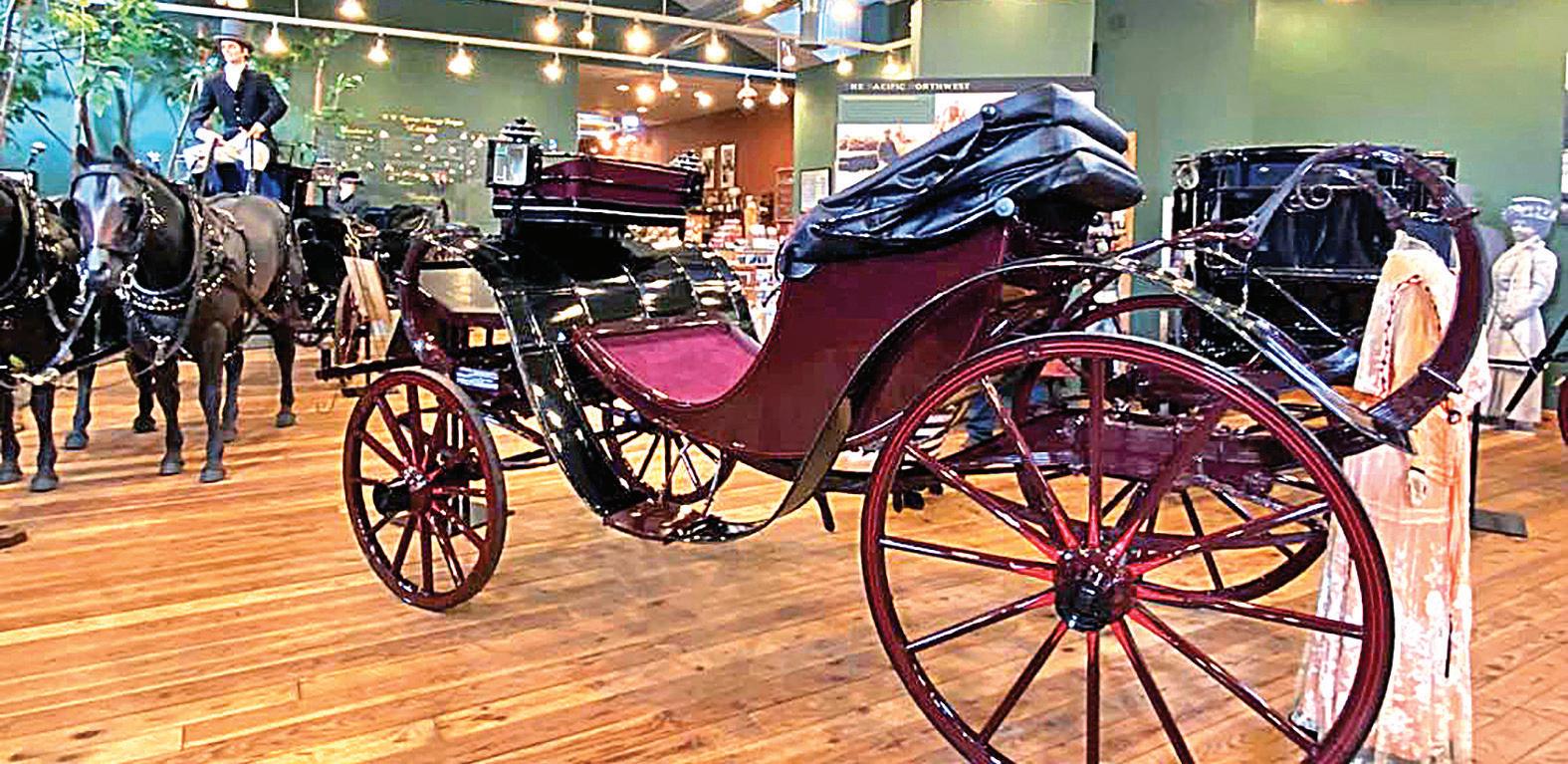
The Northwest Carriage Museum, Raymond. It showcases 60 restored 19th-century horse-drawn vehicles and thousands of period artifacts, and interactive exhibits.
That’s because new items keep being added.
It’s not surprising the Carriage Museum is North Pacific County’s most-visited tourist attraction.
Voted one of Washington’s best museums. It is a “must see” destination while visiting the Pacific Northwest. Visitors are often surprised to find such a world-class collection of horsedrawn vehicles in the small town of Raymond.
In addition to many vehicles, the museum houses many period artifacts from the 19th century. Clothing, travel trunks, harness gear, hand tools, carts and an amethyst glass collection are beautifully displayed.
The Northwest Carriage Museum is at the junction of U.S. Highway 101 and State Route 6 in Raymond. Right outside their doors is the Willapa River and a well-maintained park, which is ideal for visitors to enjoy a picnic.
The Northwest Carriage Museum is open year round from 10 a.m. to 4 p.m. It has a unique gift shop feathering a variety of jewelry, books, toys and local products. Group tours are welcome and can be arranged in advance. Admission discounts are offered for families, seniors, military personnel and AAA members. Discounts will include reduced adult admission and gift shop purchases. Open daily from 10 a.m. to 4 p.m. Standard admission is $10 for adults, $9 for seniors, $5 per child and $25 for a family.
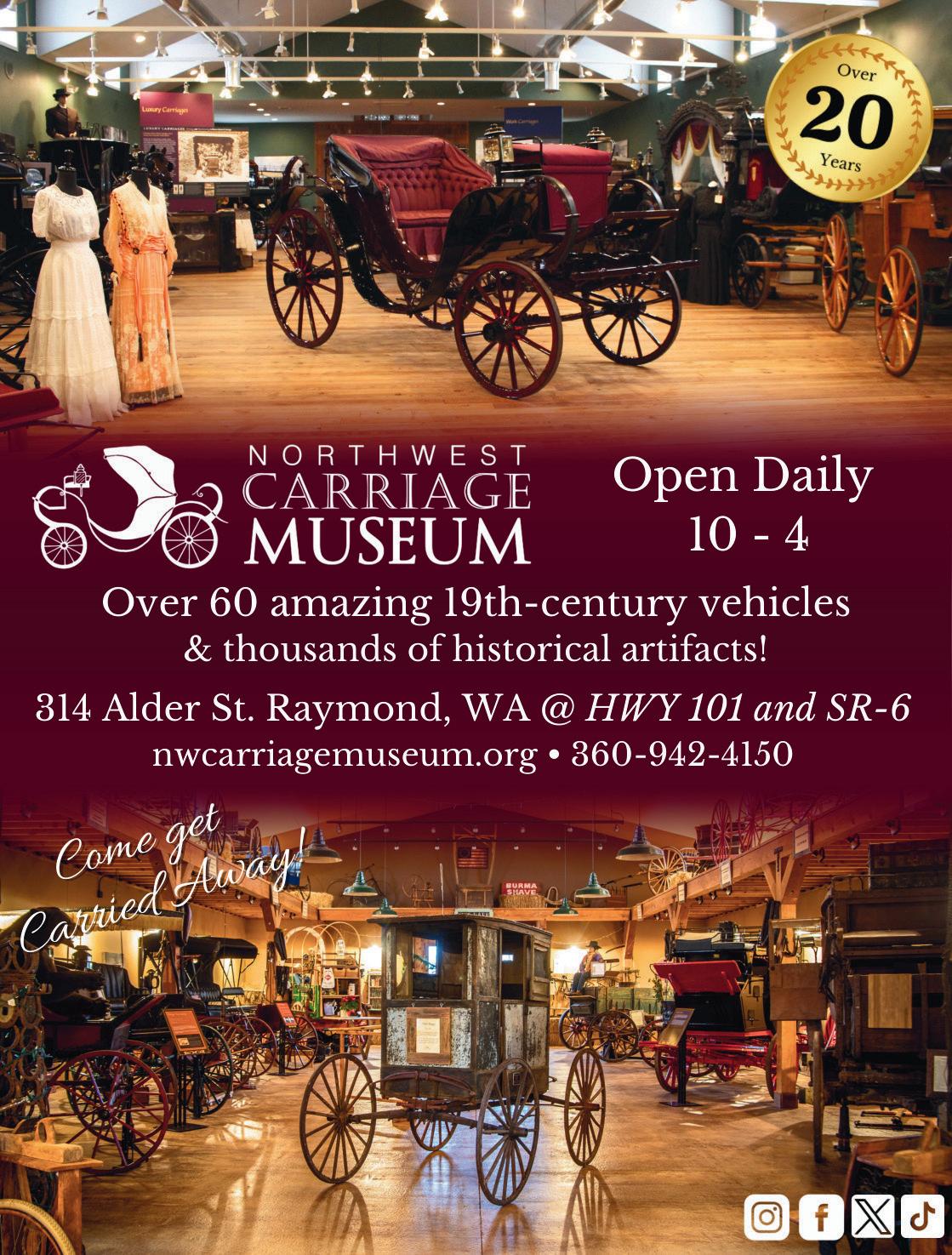

Astoria has been called “a little San Francisco on the hill,” an image easy to understand considering its Victorian architecture, river-front trolley and the age-old vision of ships passing on their way out to sea.
There are lots of chances to touch history in this 211-year-old city, but the vision of Astoria is planted firmly in the future.
Astoria has a working waterfront, a ribbon of canneries, warehouses and maritime concerns. Columbia River bar and
river pilots maintain offices here, regularly ferrying out to the huge ships that traverse the river to help make safe passage. Your first view of the city from the Washington side of the Columbia, with the pale green towers of the Astoria Bridge rising into the sky, makes some think of the mythical city of Oz. Crossing the 4.4-mile-long, razor straight causeway from Washington on a sunny day strengthens that impression, as snowy Mount St. Helens glistens to the east.
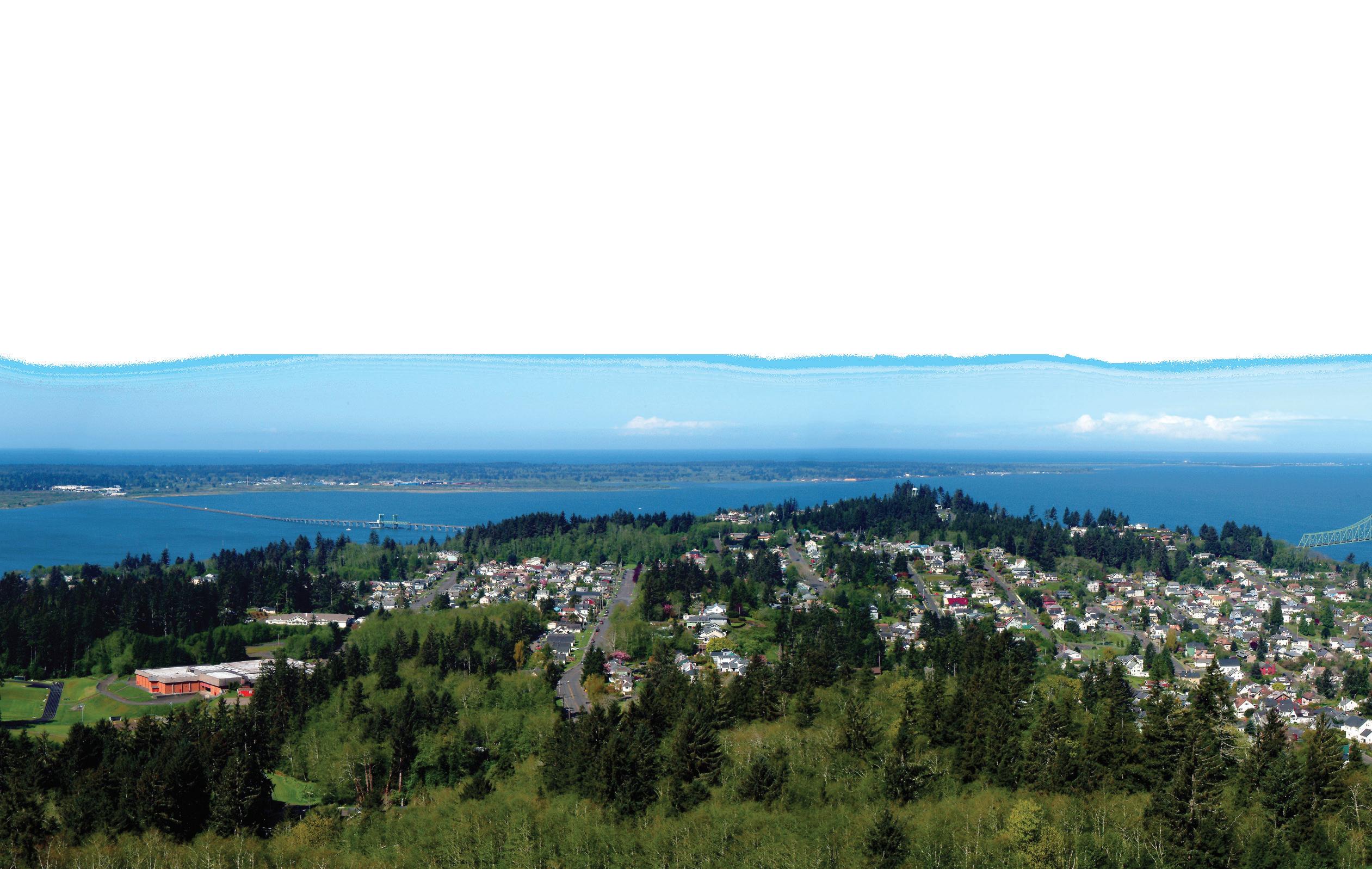
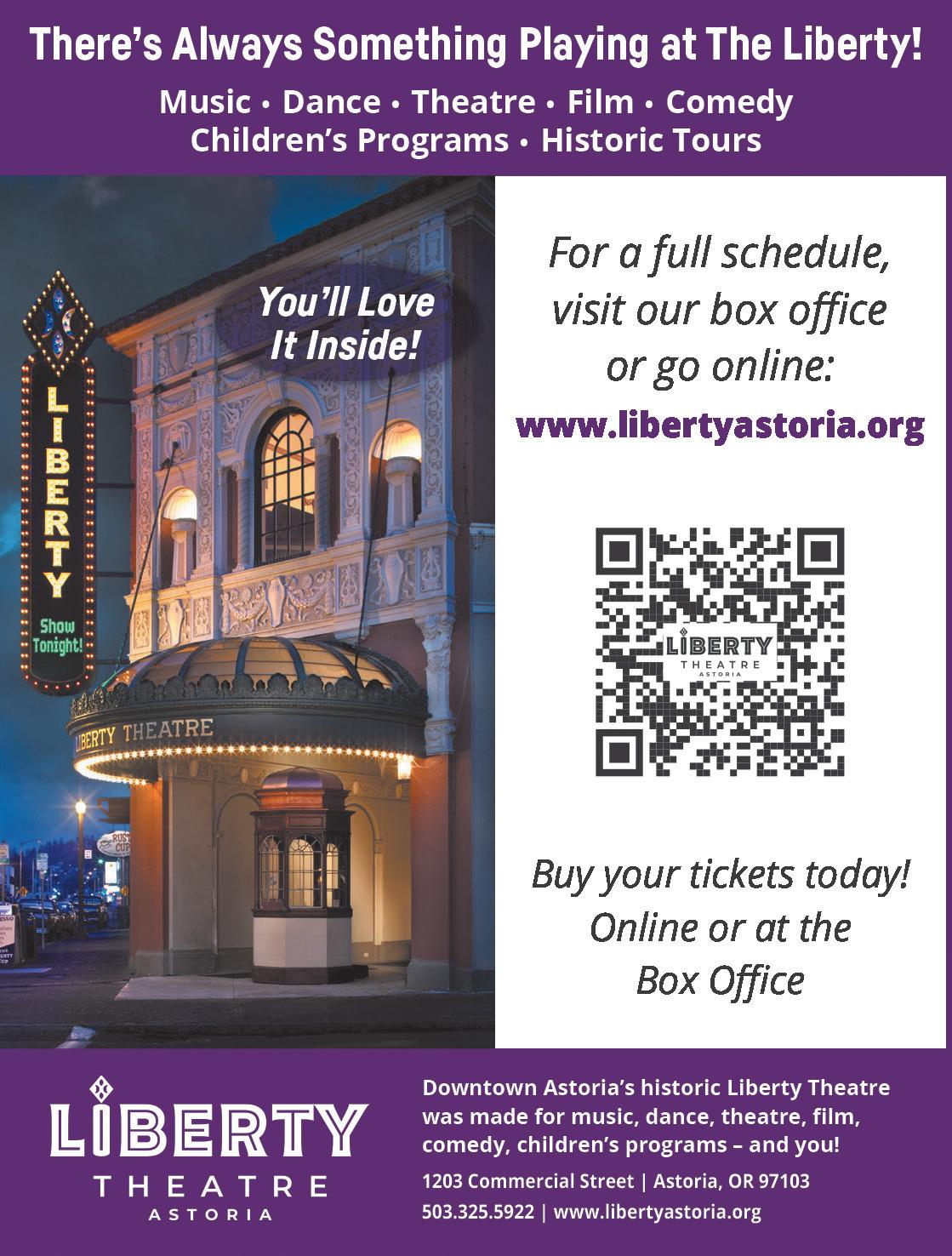
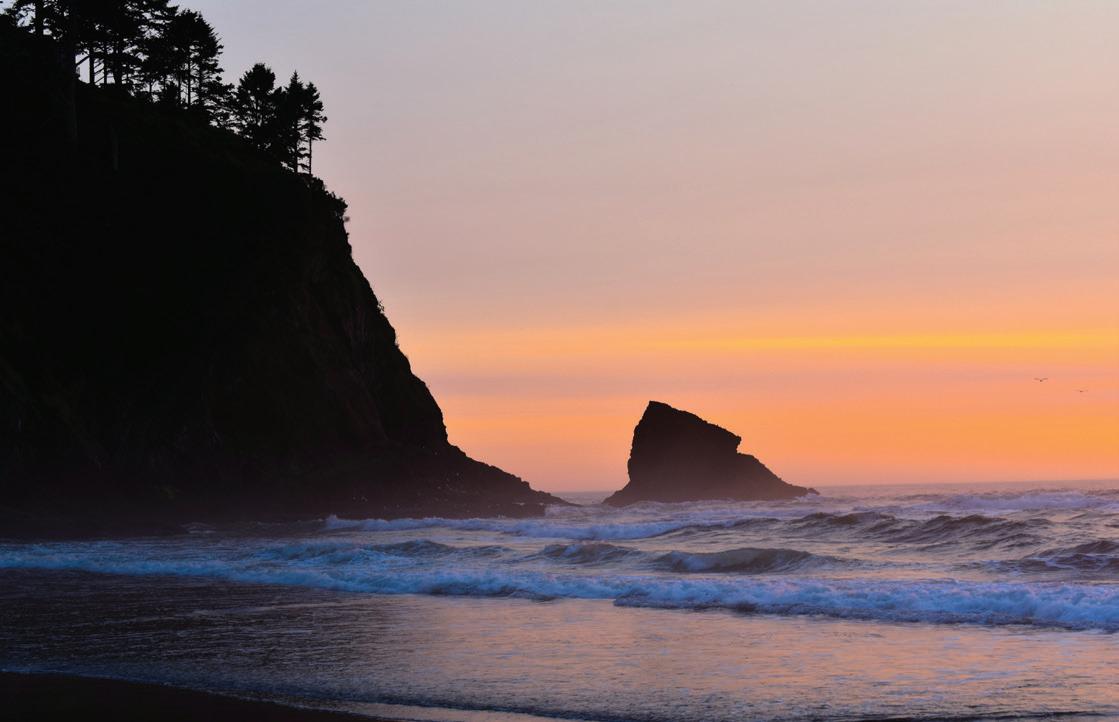

Turning left at the bottom of the bridge will take you into downtown Astoria, an area rich with unique stores, restaurants and architectural gems including the Liberty Theater, a major performing arts venue.
A little farther east, you’ll come to the Columbia River Maritime Museum at 1792 Marine Drive. A nationally acclaimed museum, it has one of the most extensive collections of nautical artifacts on the West Coast.
The freshly restored Columbia River lightship is a fascinating artifact to explore.
The museum parking lot is good place to leave your car for a trolley ride uptown. Fares are $1 per boarding or pay $2 on/off all-day, and it takes about 35 to 45 minutes to make a round trip. Travel to the very top of Coxcomb Hill to find one of the city’s crown jewels: The Astoria Column. This 125-foot monument commands an awe-inspiring view of the river and the surrounding area. To get to it, follow the signs from downtown. Tossing balsawood toy planes from it is a fun tradition.
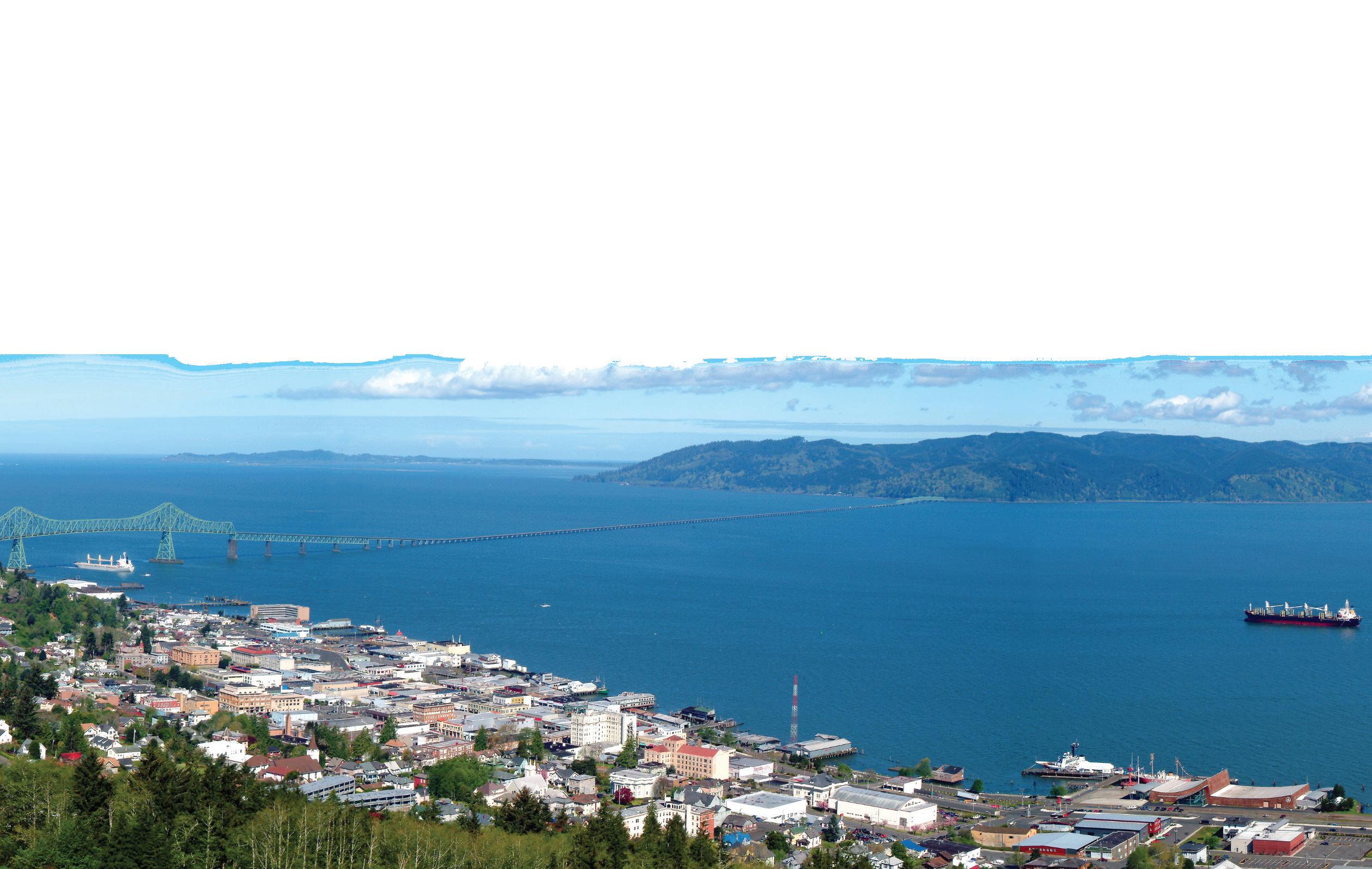
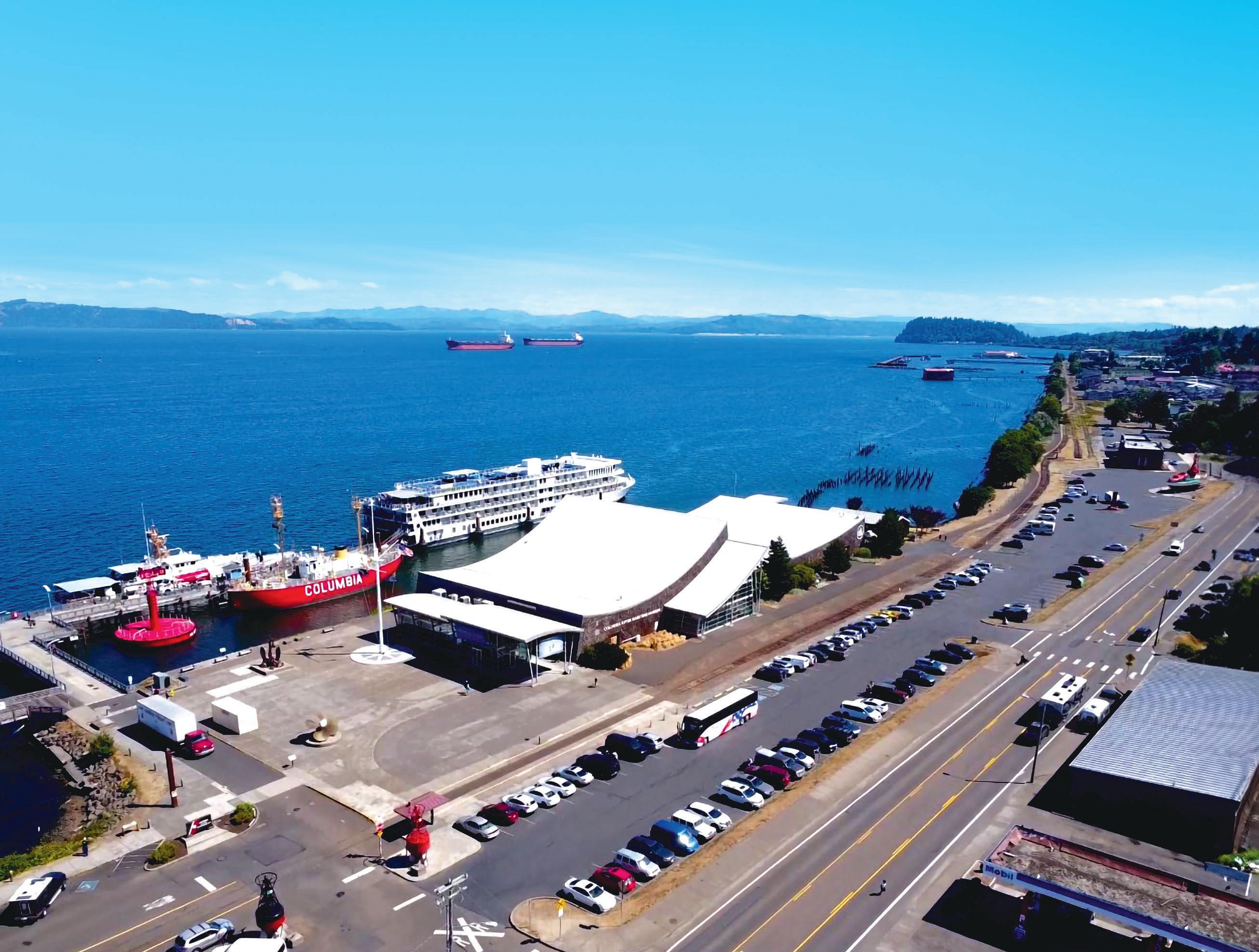
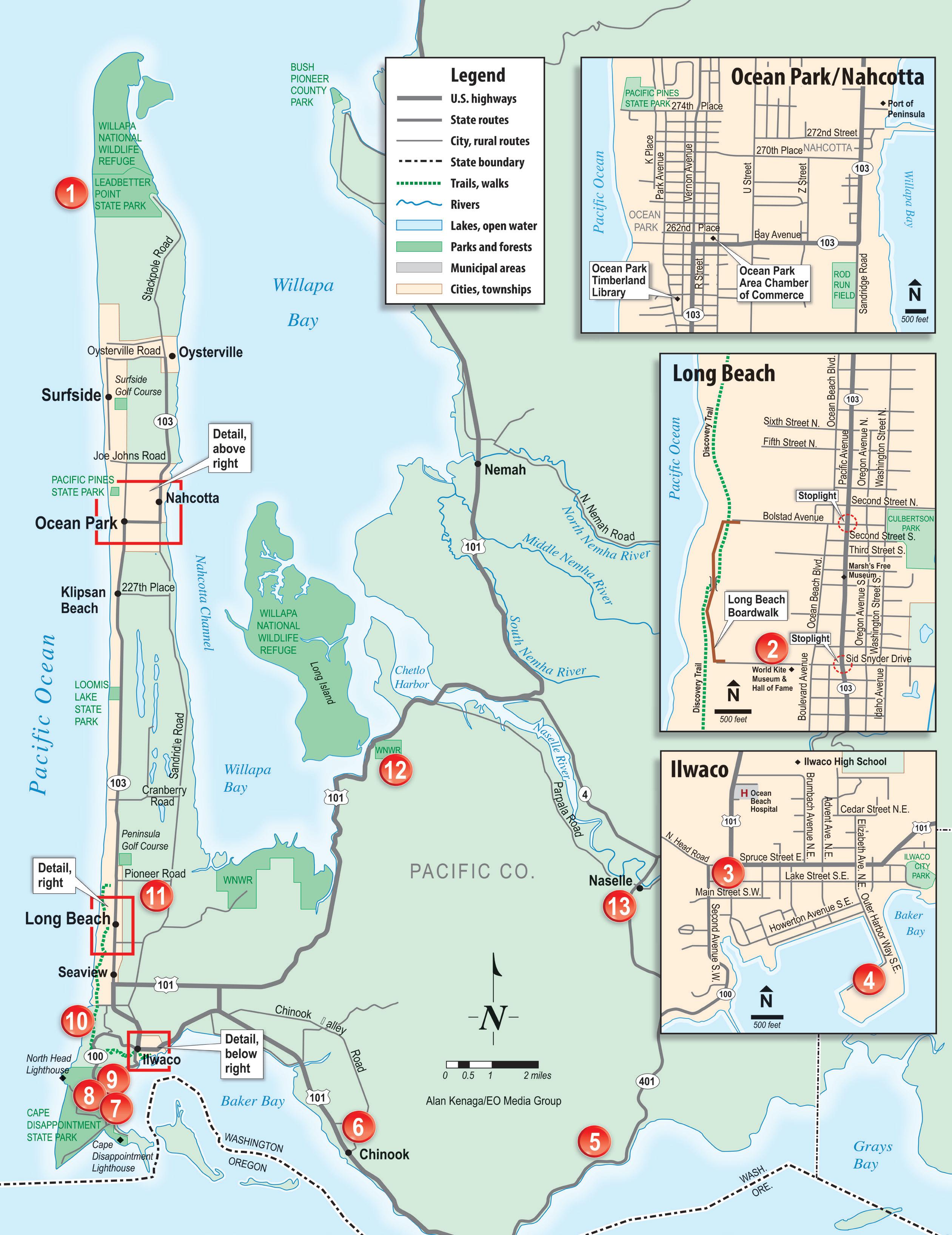
1. Leadbetter Point State Park
2. World Kite Museum
3. Columbia Pacific Heritage Museum
4. Port of Ilwaco
5. Knappton Cove Heritage Center
6. Fort Columbia State Park
7. North Head Lighthouse and Cape Disappointment Lighthouse
8. Cape Disappointment State Park
9. Lewis & Clark Interpretive Center
10. Discovery Trail
11. Cranberry Museum
12. Willapa Interpretive Art Trail
13. Appelo Archive Center





